#this was originally a tag essay
Explore tagged Tumblr posts
Note
OP's argument contains approximately 43 incorrect statements and assumptions in total, which I will respond to in detail below:
Realistically, Aragorn has no claim to Gondor’s throne
wrong :-)
969 year difference Twenty six generations of human lived, breathed and died since the last King of Gondor.
okay so this is... a bit more complicated
the last King of Gondor (excluding the High Kingship claim on Isildur's side) was Earnur, who died in TA 2050.
Earnur was born TA 1928, making him approximately the same generation as Aranarth (TA 1938) on Aragorn's side and Vorondil (TA 1919) on Faramir's side.
Counting from my family tree, there are 15 generations on Aragorn's side since Aranarth (and Earnur), and the stated 26 on Faramir's side since Vorondil (and Earnur).
Pelendur was 40 when Vorondil was born; Vorondil was 41 when Mardil was born. Their average generation time on the Steward side would be around 40 years, and the average Gondorian would live for another 80 years past that.
The average generation time on the Dunedain side is closer to 70 years; and the average Dunedain would live for again, another 80 or so years afterwards (excluding the ones who died in orc raids)
That gives us approximately 25 generations worth of Gondorians in the time between Earendur and Aragorn, 14 generations of Dunedain, and one generation of peredhel.
except, since they live a bit longer, there were likely Gondorians up to the mid-2100s and Dunedain up to the 2200s who remembered the (short) reign of Earnur. Herion was the last Steward born before Earnur's death, so only 22 of those Stewards were actually born after Earnur's rule. on the Dunedain side, 2 of the 15 chieftains were born during Earnur's rule.
The Old Kings of Gondor are distant memories.
Faramir would like to object:

There are Loremasters in Gondor dedicated to the study of Gondorian history: furthermore, this continues traditions dating back to the late Numenor period, when there were still those few old Numenoreans who could somewhat see the Straight Line, hence how they got to Valinor/Tol Eressea in the first place.
What SHOULD have happened is after a generation or two, the Stewards of Gondor claimed full kingship. And because the line of kings had died out, no one would care. It happened almost ONE THOUSAND YEARS AGO.
It happened almost one thousand years ago, yes. At Aragorn's coronation, he quite famously recites the Et Earello verse, first spoken by Elendil about three thousand years ago, and his crown is fashioned after the helm of Isildur.
Elros ruled almost six thousand years ago and most anyone important, including assorted Chieftains and Stewards, probably knows his brother personally. Ecthelion died in FA 510, and Denethor's father bore his name as that of a famous elven warrior. Before him was Turgon and Turin II; Beren, Egalmoth, Morwen, Turin I, Dior, and assorted Hurins lie further up the family tree.
The memory of Gondor is long, and their traditions longer.
Aragorn may have a direct line of descent to Isildur, but that’s old news.
He is the direct heir of Isildur, who was the eldest son and heir of Elendil, who was the heir of Elros, who was the first King of Numenor and the heir of the High Kingship of the Noldor and the Sindar, and the great-great-grandson of Melian the Maia.
Aragorn is some foreigner, who is NOT a noble, and spent most of his time wandering the wilderness as a Ranger.
He spent 23 years (a third of his adult life, at the time) as Thorongil, serving in the army of Gondor alongside Steward Ecthelion II, to the point where Ecthelion II may have liked him more than Denethor.
He then spent several years acting as a scout in the early phases of the War of the Ring, including capturing Gollum in TA 3008. Afterwards, he returned to Arnor as a Strider the Ranger, wherein he was tasked with guarding the Shire. His "wandering in the wilderness" was in fact his cover for keeping the Ring hidden and Frodo guarded.
Remember, not all who wander are lost, and the crownless again shall be king :)
For reference, all this information is available in summary on Tolkiengateway which the OP has most kindly linked.
Legitamacy [sic] of bloodline isn’t the only factor that makes a king. You also need land, and armies, and some degree of cooperation from fhe [sic] local nobles to crown yourself king.
Land: the entire region of Arnor as controlled by the Dunedain. Armies: he brought the Dunedain and most of Southern Gondor in what was practically a miracle army at the Pelennor. Cooperation from local nobles: he was something of the favorite not-son of Ecthelion II (perhaps why Denethor distrusted him?) and Faramir in fact officiated his coronation:

he also had the support of Imrahil, for what it's worth.
What happened in Return of the King is the current ruler Denethor, was a bad ruler who screwed up badly and was in league with Sauron. Then Denethor died, and Faramir was injured in battle. Faramir then should have gone on to become the ruler of Gondor, as Denethor’s heir.
At least check out sparknotes before you make such a bold claim? Denethor definitely wasn't doing great at the end, but he was most certainly not "in league with Sauron": rather, he was in a state of Sauron-induced depression at the thought of impending Sauron-induced doom. (Poor guy) After Denethor's death, Faramir went on to become the Steward of Gondor as Denethor's heir, part of whose role was to grant the kingship to the rightful claimant.
But here comes Aragorn, who turns a siege with an army fo [sic] the Dead, and tricks the enemy into fleeing wih [sic] the ships. He has the banner of Gondor’s king, heals some people, BOOM. He is king. No contest, little pushback. Faramir, who is by right the next ruler of Gondor, because his farher [sic] and ancestors have been ruling Gondor doe [sic] the past thousand years, accepts Aragorn as king.
Aragorn brings hope in the form of sudden and unexpected reinforcements, turning a certain death into a potential victory, bearing the symbol of Elendil and the White Tree. Essentially, it's like if King Arthur showed up to the middle of the Battle of the Somme and saved several thousand lives while holding Excalibur up.
He then performs what is seen by the people of Gondor as miracles akin to the elves of old: the hands of a king are the hands of a healer, as so the loremasters tell. Not only does he heal the soldiers, but he specifically heals the injuries of the Shadow dealt by the blows of the Witch-King of Angmar himself, after the Shadow's victims were thought to have met certain death. Additionally, this tradition likely dates back to Elros having some potentially Maia-derived power, similar to Elrond healing the Morgul-knife.
It is Faramir's official job to cede the throne to Aragorn, which both of them recognize. Additionally, part of the process involves the ceremonial acceptance of the people of Minas Tirith:


I would like to note that Faramir was on the edge of death and Aragorn applied some magic medicine to heal him.
Asea aranion/kingsfoil doesn't do anything for *Mannish people not of the Line of Elros, making it a very effective demonstration of Aragorn's bloodline through the "hands of the king are the hands of a healer" tradition- the medicine isn't magic, Aragorn is, and he just saved Faramir's life by manually kicking Sauron-remnants out of his head.
I dunno about you, but if I was Faramir, and my bloodline ruled Gondor for centuries, and I was up for kingship because Denethor just died, I would ve [sic] a tad reluctant to give it tyo [sic] some foreigner who showed up just today.
He would in no way be up for kingship anymore than Ioreth would; Aragorn's descent through the Line of Isildur remains the line of the High Kings of Arnor and Gondor. Additionally, Aragorn as Thorongil has been around Gondor for 20+ years and was already beloved by the people and other nobility alike.
How i wouldve written is:
Given OP's previous plethora of errors, I think we can all agree that it's lucky this is not the case
The Stewards of Gondor become kings, and only a few historians care about this, because it is ancient history.
Someone of a high station serving under the king has previously declared the heir's claim void and become king; that someone is called Castamir and that event is called the Kin-strife, one of the bloodiest eras of Gondorian history in which Osgiliath fell to civil war and its palantir was lost. Additionally, the realm of "ancient history" becomes very different when Elrond is one of the leading loremasters of Middle-Earth, and Gondor has surviving oral traditions dating back to at least middle period Numenor (as evidenced by the recognition of Et Earello and the familiarity with Sindarin in general, and Quenya among loremasters)
Denethor, the corrupt ruler dies.
Denethor does die, and is the Ruling Steward at the time of his death. He is no more corrupt than Theoden-with-Grima is, though he does make some exceedingly ill-advised decisions.
The hero Aragorn shows up and helps drive off the armies of Mordor, saving Gondor.
Yes, he does in fact show up in the ships of the Corsairs with reinforcements and the standard of Gondor/Elendil.
Aragorn heals Faramir, has a nice little talk of “hey I saved your city, I save your life, you are now in my debt, would you give me the throne pretty please? Oh and you are weak and bed bound, meanwhile I have this legendary sword. In case you were wondering.”
He wouldn't need to ask: Faramir is more than willing to do his duty and reinstate Aragorn as King, especially given that both his claim and leadership have been well proven.
And then Aragorn becomes king of Gondor.
Specifically, he becomes King of Gondor and Arnor, though in practice he's mostly king of Gondor because he grants the Shire independence.
Yo I have a hot take about how Aragorn is not the rightful king of Gondor
Wanna hear it?
After the last hot take, I dread to. Please tell me.
#not silm#not art#lotr#aragorn#this take is about as hot as denethor's death and exactly as ill-advised#this was originally a tag essay#edited to clarify mannish people re kingsfoil
90 notes
·
View notes
Text
"A story doesn't need a theme in order to be good" I'm only saying this once but a theme isn't some secret coded message an author weaves into a piece so that your English teacher can talk about Death or Family. A theme is a summary of an idea in the work. If the story is "Susan went grocery shopping and saw a weird bird" then it might have themes like 'birds don't belong in grocery stores' or 'nature is interesting and worth paying attention to' or 'small things can be worth hearing about.' Those could be the themes of the work. It doesn't matter if the author intended them or not, because reading is collaborative and the text gets its meaning from the reader (this is what "death of the author" means).
Every work has themes in it, and not just the ones your teachers made you read in high school. Stories that are bad or clearly not intended to have deep messages still have themes. It is inherent in being a story. All stories have themes, even if those themes are shallow, because stories are sentences connected together for the purpose of expressing ideas, and ideas are all that themes are.
#original post#text post#500#1k#2k#btw i know my definition of death of the author is loosey goosey here#it wasn't the main point so i went informal with it! as ppl in the tags have pointed out it isn't exact#and i do recommend reading the wikipedia article or similar (possibly even the essay itself if you're narsty) if you want to learn more!#wasn't expecting this to take off so my apologies to my barthes-heads out there#love you mwah#5k#10k#15k#20k
30K notes
·
View notes
Text
ok, once and for all: is it rude to add things to people's posts? no nuance; none of us can know how op or anyone else will see our contribution. or 'contribution'.
#tumblr etiquette#tumblr#seriously this plagues me#i'm on the side of almost always rude#so i almost never do it#but i feel like it used to be seen as much ruder than it is now?#anyhow that's why all my essays are tags and not added to the original#thanks for coming to my tumblr post
1K notes
·
View notes
Text
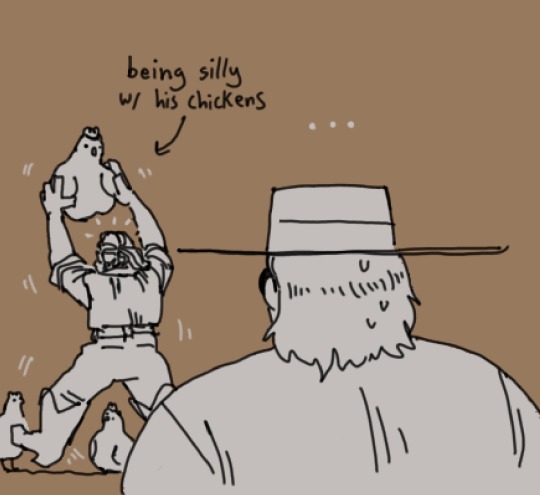
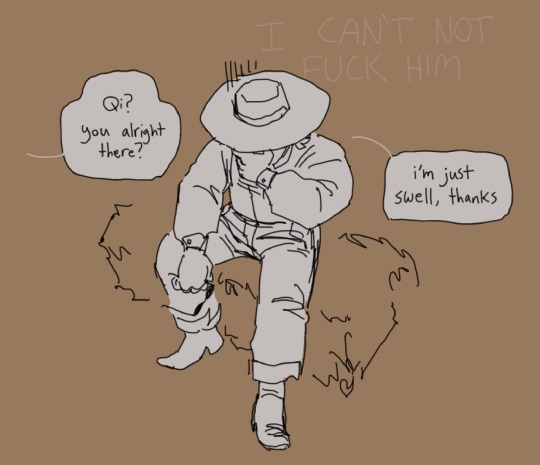
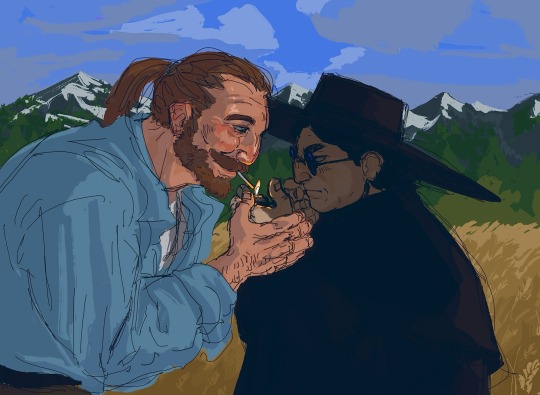
pelican town, ‘72
#stardew valley#stardew valley spoilers#sdv#sdv spoilers#grandpa#mister qi#mr. qi#idk how dates work in stardew universe im just bullshittin#i love qi’s huge fucking eyebrows you dont notice them at first but theyre there#(gives our collective grandpa a ponytail) i think he had one. whatever#’why isnt mister qi blue’ my hc is he is blue from long-term iridium supplementation#and was originally just a regular person#but also it’s nice to see ur fav be like a normal human color#if u read tag essays tho consider this:#qi discovers secret to immortality (consuming iridium in a specific manner)#wants to share discovery with his farmer (player’s grandpa) and in that way. they will have all the time in the world to build#a perfect farming/business empire whose legacy will last forever and ever and theyll be 2gether forever#but it turns out. like a lot of normal people would. his farmer does not want to live forever#and obv he doesn’t#in an attempt to try not to ever lose the thing that means more to him than anything else in the world. qi inadvertantly ensures he will#because his farmer is dead. and he’s going to live forever#but. it’s kind of ok. because he has infinite money and was able to figure out how to talk to his dead bf#and now YOU help them fulfill their joint goal of making the farm’s legacy last forever#smile. heart#sobbing
1K notes
·
View notes
Text

day 1421
#uh just a heads up if you expand the tags to see all there's. a lot. very long#amphibian#frog#poison dart frog#based on my most popular frog to date (day 651)#inspired by everyone pointing out what they think it looks like#here's a fun secret fact the original guy is actually a phantasmal poison dart frog (Epipedobates tricolor)#(according to the original artists title of the drawing)#not Anthony's poison arrow frog (Epipedobates anthonyi)#i feel too awkward to really point it out though because they look the exact same. i cannot tell if there is a difference#im half convinced the same frog was just discovered and named twice#its very curious btw if you go on the (english) wikipedia page for either species it doesn't mention the other#while hereptiles.info (no idea if this is a trustworthy site) lists both names as common names for the same frog (incorrectly??)#while inaturalist lists them as two different frogs. curiously with tricolor having wayyyyy fewer photos#ok anyway that's my rant i went on a whole journey trying to figure out if these are the same frog or not and i have no answer#i did some more 'research' and i am more confused. some sources seem to imply they are now considered the same species ( e. tricolor)#i think my conclusion is i am willing to agree the drawing looks more like e. anthonyi. it seems like tricolor is generally less vibrant re#and the white is darker and more green?#i feel like thumblr should stop me from typing more in the tags at this point this is a whole essay#at this point i am failry convinced this is specifically the Santa Isabel frog. isthat the real subspecies or morph or whatever#or just the name pet sites are using to sell it??#i even found some sources (frog selling websites) refering to it as “Epipedobates Anthonyi 'Santa Isabel' Phantasmal Poison Dart Frog” lol#Anyways if you read this far hi. species are confusing. i am not a frog scientist#the first few tags are like an hour old now i just kept trying to figure it out and adding more tags
3K notes
·
View notes
Text
"Ryuurin, Hanpatsu, Tsugai no Ryuusei" -- the incantation for World Slash, and an epitaph to Gojo Satoru.

In JJK, incantations are supposed to boost power of a particular technique. When Sukuna used World Slash to kill Gojo, he imposed a binding vow that allowed him a single-use activation without the requirement of a hand sign, in exchange for using incantations and directing the attack for all subsequent uses.
In this post I'll examine the specific phrases in Sukuna's incantation and argue that each phrase of the incantation corresponds to an application of Gojo's Limitless technique. Then I'll briefly relate this to the binding vow requirements to argue that Sukuna's promise to never forget Gojo for the rest of his life is one of the conditions of that binding vow.
1. "龍鱗"
First, "ryuurin" (dragon scales) describes the basic application of Limitless, a strong defensive barrier like the scales of a dragon. This one is the most obvious, hinted at by Sukuna's words at the beginning of the fight, telling Gojo he plans to "strip away his scales." More will be said about the dragon references, in the discussion of the third phrase.
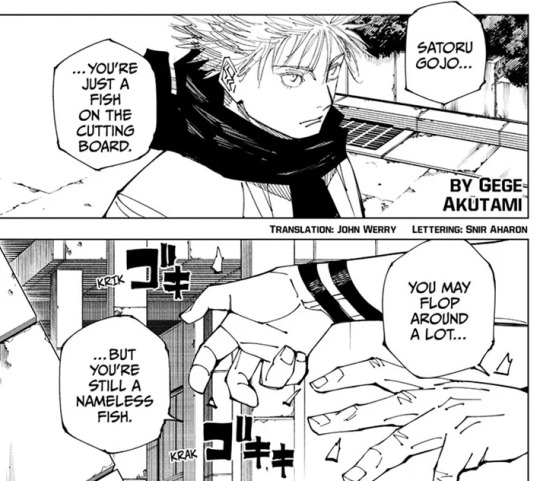
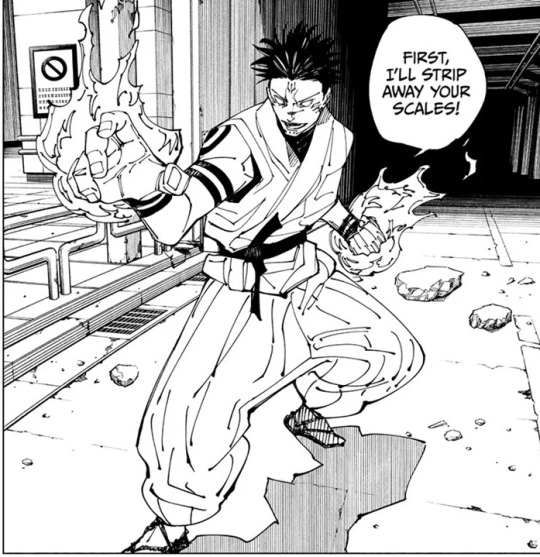
Less relevant but still interesting - there’s also a Buddhist reference here, according to this forum post:
At surface, straight value, it is just the literal scales of a dragon. The word can also be used to mean "a large quantity of things". Ryurin is also a metaphor for the power/authority/influence of heroes and of the Heavenly People (the residents of the Japanese version of the Devaloka, where devas and gods reside. Just a heavenly realm, basically.) Lastly, Ryurin means a dangerous condition/situation or a dangerous thing. So. For Sukuna, its basically 'dangerous divine power/authority'.
2. "反��"
Next, "hanpatsu." Hanpatsu means recoil, which is the equal and opposing force of an action. This describes Purple, which is the rebounding damage created by the collision of Red and Blue. At first I thought hanpatsu described Red, because Red is a “repulsing” force. Except “recoil” is not the same thing as repulsion. Another possibility was that hanpatsu described the relationship between Red and Blue — Red as the “equal and opposite” of blue, and vice versa. But we know the two aren’t equal in power, and neither technique is accurately described as the “recoil” or rebounding force produced by the other.
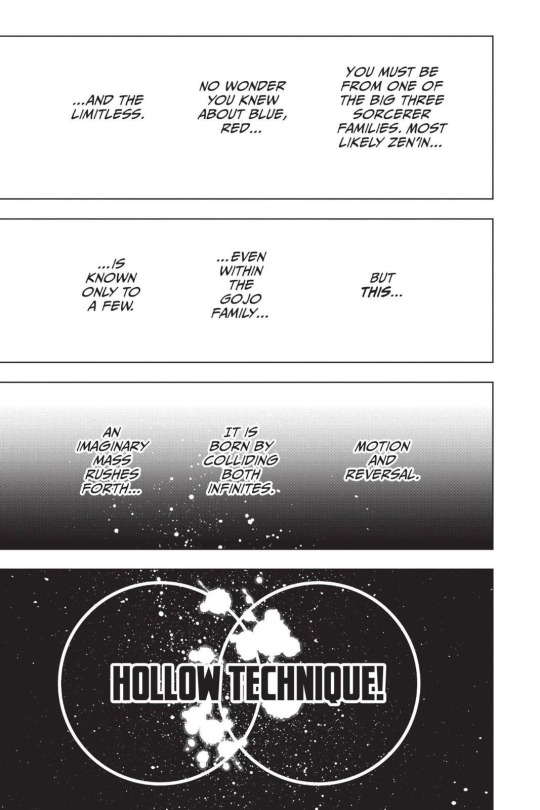
3. "番いの流星"
Finally, "tsugai no ryuusei." A few things here. First, the wordplay and translation. Like ”Ryuurin”, this term references dragons. Here Ryuusei, meaning meteor or comet, is also pun on the word dragon, ryuu (which isn’t novel, see the Japanese word for Pokémon move Draco Meteor, et al.). So a plausible English translation could also be “Twin Dragon Meteors.” Second, how dragons are relevant to Sukuna’s mythology. In Hida, there is a temple Senkoji said to be founded by “Ryomen Sukuna … approximately 1,600 years ago. A central architectural feature of the temple it Dragon Ceiling, a portrait of two dragons painted by Kano Tansetsu on the ceiling of the main buliding. From the website,
According to temple legend, a general of the Sengoku period committed suicide there by seppuku, staining the floor with blood. For the repose of general’s soul, the floorboards were incorporated into the ceiling of the main temple. Some time later, Kano Tansetsu visited Senkoji and painted the dragons on the ceiling. At Senkoji, the objects of worship include not only the main temple and the priest’s quarters, but also the entire temple complex.
According to this Reddit post, the temple’s founding tale describes how Sukuna fought off a dragon god living in the mountain and built a shrine in its place. So — from the fact that dragons are the mythological enemy of the figure Ryomen Sukuna, we may infer that the words of the incantation refer to an enemy or target of the World Slash technique.
What could "twin meteors" refer to other than the related techniques of Limitless, the twin floating spheres Red and Blue?
Another potential connection to Red/Blue rooted in dragon mythology is the tide jewels — the tide-ebbing (a repelling force, like Red) kanju and tide-flowing (an attracting force, like Blue) manju, possessed by Ryuujin, the Sea King.
The final reason I think the incantation refers to Gojo’s technique is because of Sukuna’s explanation in 236 for World Slash — he describes the process of developing the technique as figuring out how to target Limitless with Dismantle. So it makes sense that the incantation to power World Slash operates by describing its target, not World Slash itself.
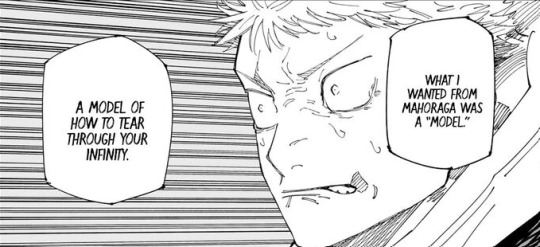
It also lends significance to the order of the incantation — first visualizing the most generalized application of Limitless (ryuurin), then passing through Purple (hanpatsu) to finally arrive at two separate applications, Red and Blue (tsugai no ryuusei) — a conceptual "bisection" of Limitless into two discrete components.
4. Binding Vows
Isn't this pretty romantic? But wait there's more. We know now after Chapter 255 that in exchange for unleashing the World Slash that killed Gojo without using the hand sign, Sukuna now has to recite the incantation every time (+using the hand signs and directing the attack with his palm) he uses World Slash.
Assuming what I've previously argued is true (the incantation describes Gojo's Limitless), this gives Sukuna's last words to Gojo another layer of significance. When Sukuna tells Gojo he will never forget him, it's not just an expression or a promise, but a statement of the binding vow Sukuna has to make in order to land the killing blow. In other words, the cost of killing Gojo is having to remember him forever, to integrate him into Sukuna's own technique through a verbal invocation that must be made every single time Sukuna uses the world bisecting slash. Yeah, that's pretty romantic.

#ryomen sukuna#gojo satoru#sukugo#A love which bisects the world. truly this is our sukugo kaisen#jjk meta#jjk#jujutsu kaisen#jujutsu kaisen meta#idk what else to tag this as#binding vows#?#jjk analysis#pardon some of the writing here this was originally a text msg I sent to a friend#it’s a very wordy outline pretending to be an essay
360 notes
·
View notes
Text
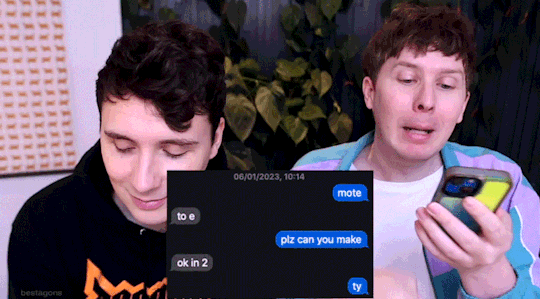
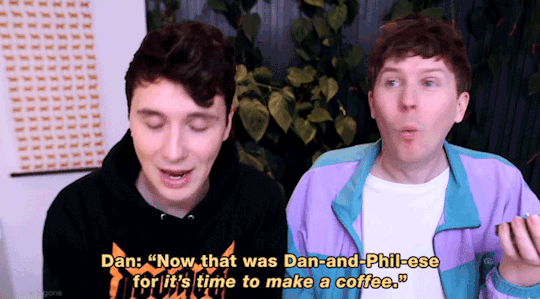

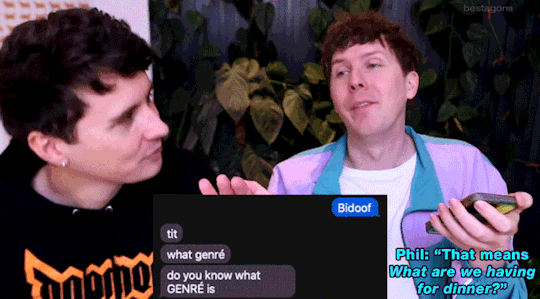

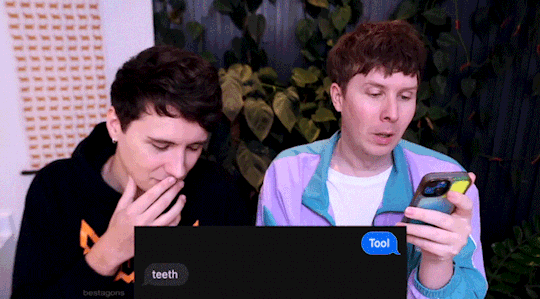


What Dan and Phil Text Each Other 4 + Familect (article)
#dan and phil#amazingphil#daniel howell#danisnotonfire#phil lester#this idea has been cooking in my brain for literally MONTHS but this weekend was literally the first day off i've had since JANUARY#which is so cruel and unusual don't get me started but anyways#and also the first time they haven't dropped something unhinged that i felt compelled to run through photoshop#also it took forever because originally i was going to do all the WDAPTEOs so like i pulled clips from 2 3 and 4#and didn't end up using any of the ones i pulled from 2 and 3 so guess i just wasted some time there#so it didn't take me actually as long to put together the actual set but like i spent a solid 5 hours working on the general project#tbf though the videos are 20 minutes long so like an hour was just watching to get the time stamps#and i didnt want to miss one by putting it on higher playback speed bc some of them are really quick#well congrats if you made it this far in my fucking tags essay about this post#this is like a 'stick around after the episode for a look behind the scenes' segment#hexagifs
292 notes
·
View notes
Text
Double Indemnity, Veritas Ratio and Aventurine

This was originally a part of my compilation post as a short analysis on the Double Indemnity references, linking to this great thread by Manya on Twitter. However, I've recently watched the movie and found that the parallels run much deeper than just the mission name and the light cone itself, plus as the short synopsis I've read online. Since there isn't really an in-depth attempt at an analysis on the film in relation to the way Aventurine and Ratio present themselves throughout Penacony, I thought I'd take a stab at doing just that. I will also be bringing up things from Manya's thread as well as another thread that has some extra points.
Disclaimer that I... don't do analyses very often. Or write, in general — I'm someone who likes to illustrate their thoughts (in the artistic sense) more than write. There's just something about these two that makes me want to rip into them so badly, so here we are. If there's anything you'd like to add or correct me on, feel free to let me know in the replies or reblogs, or asks. This ended up being a rather extensive deep dive into the movie and its influences on the pairing, so please keep that in mind when pressing Read More.
There are two distinct layers on display in Ratio and Aventurine's relationship throughout Penacony, which are references to the two most important relationships in the movie — where they act like they hate/don’t know each other, and where they trust each other.
SPOILER WARNING for the entire movie, by the way. You can watch the film for free here on archive.org, as well as follow along with the screenplay here. I will also be taking dialogue and such from the screenplay, and cite quotes from the original novel in its own dedicated section. SPOILER WARNING for the Cat Among Pigeons Trailblaze mission, as well.

CONTENT WARNING FOR MENTIONS OF SUICIDE. YOU HAVE BEEN WARNED.
To start, Double Indemnity (1944) is a film noir by Billy Wilder (and co-written by Raymond Chandler) based on the novel of the same name by James M. Cain (1927). There are stark differences between the movie adaptation and the original novel which I will get into later on in this post, albeit in a smaller section, as this analysis is mainly focused on the movie adaptation. I will talk about the basics (summaries for the movie and the game, specifically the Penacony mission in tandem with Ratio and Aventurine) before diving into the character and scene parallels, among other things.

—
[THE NAME]
The term "double indemnity" is a clause in which if there’s a case of accidental death of a statistically rare variety, the insurance company has to pay out multiple of the original amount. This excludes deaths by murder, suicide, gross negligence, and natural causes.

The part of the mission in Cat Among Pigeons where Ratio and Aventurine meet with Sunday is named after the movie. And before we get further into things, let's get this part out of the way: The Chinese name used in the mission is the CN title of the movie, so there's no liberties taken with the localization — this makes it clear that it’s a nod to the movie and not localization doing its own thing like with the mission name for Heaven Is A Place On Earth (EN) / This Side of Paradise (人间天堂) (CN).

—
[SUMMARY OF THE 1944 MOVIE]
Here I summarised the important parts that will eventually be relevant in the analysis related to the game.

Insurance salesman Walter Neff, wounded from a gunshot, enters his office and confesses his crime on a dictaphone to his boss Barton Keyes, the claims manager. Much earlier, he had met Phyllis Dietrichson, the wife of Mr. Dietrichson and former nurse. Neff had initially wanted to meet Mr. Dietrichson because of car insurance. Phyllis claims her husband is mean to her and that his life insurance goes to his daughter Lola. With Neff seduced by Phyllis, they eventually brew up a scheme to murder Mr. Dietrichson in such a way that they activate the "double indemnity" clause, and the plan goes off almost perfectly. Initially, the death is labeled a suicide by the president of the company, Norton.
Keyes finds the whole situation suspicious, and starts to suspect Phyllis may have had an accomplice. The label on the death goes from accidental, to suicide, to then murder. When it’s ruled that the husband had no idea of the accidental policy, the company refuses to pay. Neff befriends Phyllis’ stepdaughter Lola, and after finding out Phyllis may have played a part in the death of her father’s previous wife, Neff begins to fear for Lola and himself, as the life insurance would go all towards her, not Phyllis.
After the plan begins to unravel as a witness is found, it comes out that Lola’s boyfriend Nino Zachette has been visiting Phyllis every night after the murder. Neff goes to confront Phyllis, intending to kill her. Phyllis has her own plans, and ends up shooting him, but is unable to fire any more shots once she realises she did love him. Neff kills her in two shots. Soon after telling Zachette not to go inside the house, Neff drives to his office to record the confession. When Keyes arrives, Neff tells him he will go to Mexico, but he collapses before he could get out of the building.
—
[THE PENACONY MISSION TIMELINE]

I won’t be summarising the entirety of Aventurine and Ratio’s endeavours from the beginning of their relationship to their final conversation in Heaven Is A Place On Earth the same way as I summarised the plot of the movie, so I will instead present a timeline. Bolded parts means they are important and have clear parallels, and texts that are in [brackets] and italics stand for the names of either the light cone, or the mission names.
[Final Victor] Their first meeting. Ratio’s ideals are turned on its head as he finally meets his match.
Several missions happen in-between their first encounter and the Penacony project. They come to grow so close and trusting with each other that they can guess, understand each other’s thoughts, way of thinking and minds even in high stakes missions. Enough to pull off the Prisoner’s Dilemma (Aventurine’s E1) and Stag Hunt Game (Aventurine’s E6) and come out on top.
Aventurine turns towards Ratio for assisting him in the Penacony project. Ratio's involvement in the project is implied to be done without the knowledge of Jade, Topaz, and the IPC in general, as he was only sent to Penacony to represent the Intelligentsia Guild, and the two other Stonehearts never mention Ratio.
Aventurine and Ratio cook up the plan to deceive Sunday before ever setting foot on Penacony. Aventurine does not tell Ratio the entirety of his plan.
Aventurine convinces Topaz and Jade to trust him with their Cornerstones. Aventurine also breaks his own Cornerstone and hides it along with the jade within a bag of gift money.
[The Youth Who Chase Dreams] They enter Penacony in the Reverie Hotel. Aventurine is taken to the side by Sunday and has all his valuables taken, which includes the gift money that contains the broken aventurine stone, the jade, and the case containing the topaz.
Aventurine and Ratio speak in a “private” room about how Aventurine messed up the plan. After faking an argument to the all-seeing eyes of Sunday, Ratio leaves in a huff.
Ratio, wearing his alabaster head, is seen around Golden Hour in the (Dusk) Auction House by March 7th.
[Double Indemnity] Ratio meets up with Sunday and “exposes” Aventurine to him. Sunday buys his “betrayal”, and is now in possession of the topaz and jade. Note that this is in truth Ratio betraying Sunday all along.
Ratio meets up with Aventurine again at the bar. Ratio tells Aventurine Sunday wants to see him again.
They go to Dewlight Pavilion and solve a bunch of puzzles to prove their worth to Sunday.
They meet up with Sunday. Sunday forces Aventurine to tell the truth using his Harmony powers. Ratio cannot watch on. It ends with Aventurine taking the gift money with his Cornerstone.
[Heaven Is A Place On Earth] They are in Golden Hour. Ratio tries to pry Aventurine about his plan, but Aventurine reins him in to stop breaking character. Ratio gives him the Mundanite’s Insight before leaving. This is their final conversation before Aventurine’s grandest death.
Now how exactly does the word “double indemnity” relate to their mission in-game? What is their payout? For the IPC, this would be Penacony itself — Aventurine, as the IPC ambassador, handing in the Jade Cornerstone as well as orchestrating a huge show for everybody to witness his death, means the IPC have a reason to reclaim the former prison frontier. As for Ratio, his payout would be information on Penacony’s Stellaron, although whether or not this was actually something he sought out is debatable. And Aventurine? It’s highly implied that he seeks an audience with Diamond, and breaking the Aventurine Cornerstone is a one way trip to getting into hot water with Diamond. With Aventurine’s self-destructive behaviour, however, it would also make sense to say that death would be his potential payout, had he taken that path in the realm of IX.
Compared to the movie, the timeline happens in reverse and opposite in some aspects. I will get into it later. As for the intended parallels, these are pretty clear and cut:
Veritas Ratio - Walter Neff
Aventurine - Phyllis Dietrichson
Sunday - Mr. Dietrichson

There is one other character who I feel also is represented in Ratio, but I won’t bring them up until later down the line.
For the sake of this analysis, I won’t be exploring Sunday’s parallel to Mr. Dietrichson, as there isn’t much on Dietrichson’s character in the first place in both the movie and the novel. He just kind of exists to be a bastard that is killed off at the halfway point. Plus, the analysis is specifically hyper focused on the other two.
—
[SO, WHAT’S THE PLAN?]
To make things less confusing in the long run whenever I mention the words “scheme” and “plan”, I will be going through the details of Phyllis and Neff’s scheme, and Aventurine and Ratio’s plan respectively. Anything that happens after either pair separate from another isn’t going to be included. Written in a way for the plans to have gone perfectly with no outside problems.

Phyllis and Neff —> Mr. Dietrichson
Goal: Activate the double indemnity clause by killing Mr. Dietrichson and making it look like a freak train accident
Payout: Twice or more of the face value of the life insurance ($100,000)
Main Actor: Walter Neff | Accomplice: Phyllis Dietrichson
During the entire time until the payout, Phyllis and Neff have to make sure to any outsiders that they look like complete strangers instead of lovers in an affair.
Step-by-step:
Neff convinces Mr. Dietrichson to sign the policy with the clause without him suspecting foul play, preferably with a third party to act as an alibi. This is done discreetly, making Mr. Dietrichson not read the policy closely and being told to just sign.
Neff and Phyllis talk to each other about small details through the phone (specified to be never at Phyllis’ own house and never when Neff was in his office) and in the marketplace only, to make their meetings look accidental. They shouldn’t be seen nor tracked together, after all.
Phyllis asks Mr. Dietrichson to take the train. She will be the one driving him to the train station.
On the night of the murder, after making sure his alibi is airtight, Neff sneaks into their residence and hides in their car in the second row seating, behind the front row passenger seat. He wears the same colour of clothes as Mr. Dietrichson.
Phyllis and Mr. Dietrichson get inside the car — Phyllis in the driver’s seat and Mr. Dietrichson in the passenger seat. Phyllis drives. On the way to the train station, she makes a detour into an alley. She honks the horn three times.
After the third honk, Neff breaks Mr. Dietrichson’s neck. The body is then hidden in the second row seating under a rug.
They drive to the train station. Phyllis helps Neff, now posing as Mr. Dietrichson, onto the train. The train leaves the station.
Neff makes it to the observation platform of the parlour car and drops onto the train tracks when nobody else is there.
Phyllis is at the dump beside the tracks. She makes the car blink twice as a signal.
The two drag Mr. Dietrichson’s corpse onto the tracks.
They leave.
When Phyllis eventually gets questioned by the insurance company, she pretends she has no idea what they are talking about and eventually storms off.
Phyllis and Neff continue to lay low until the insurance company pays out.
Profit!
Actual Result: The actual murder plan goes almost smoothly, with a bonus of Mr. Dietrichson having broken a leg. But with him not filing a claim for the broken leg, a witness at the observation platform, and Zachette visiting Phyllis every night after the murder, Keyes works out the murder scheme on his own, but pins the blame on Phyllis and Zachette, not Neff.

Now for Aventurine and Ratio. You can skip this section if you understand how deep their act goes, but to those who need a refresher, here’s a thorough explanation:
Aventurine and Ratio —> Sunday
Goal: Collect the aventurine stone without Sunday knowing, ruin the dream (and create the grandest death)
Payout: Penacony for the IPC, information on the Stellaron for Ratio, a meeting with Diamond / death for Aventurine
Main Actor: Aventurine | Accomplice: Veritas Ratio
From the moment they step onto Penacony, they are under Sunday’s ever present and watchful eyes. “Privacy” is a foreign word to The Family. They have to act like they don’t like each other’s company the entire time and feed Sunday information through indirect means so that the eventual “betrayal” by Ratio seems truthful to Sunday. Despite what it looks like, they are closer than one would ever think, and Ratio would never sell out a person purely for information.
Step-by-step:
After Sunday takes away the bag of gift money and box, Aventurine and Ratio talk in a room in the Reverie Hotel.
Aventurine establishes the Cornerstones’ importance, and how he lost the gift money and the case containing the Cornerstones to Sunday. Ratio turns to leave, saying “some idiot ruined everything”, meaning the Cornerstones were vital to their plan. (Note that Ratio is not wearing his alabaster head while saying it to said “idiot”.)
Aventurine then proceeds to downplay the importance of the Cornerstones, stating they are “nothing more than a few rocks” and “who cares if they are gone”. This lets Sunday know that something suspicious may be going on for him to act like it’s nothing, and the mention of multiple stones, and leaves him to look up what a Cornerstone is to the Ten Stonehearts of the IPC.
Ratio points out his absurd choice of outfit, mentioning the Attini Peacock and their song.
Ratio implies that without the aventurine stone, he is useless to the IPC. He also establishes that Aventurine is from Sigonia(-IV), and points out the mark on his neck. To Sunday, this means that Aventurine is shackled to the IPC, and how Aventurine may possibly go through extreme lengths to get the stone back, because a death sentence always looms above him.
Aventurine claims Ratio had done his homework on his background, which can be taken that this is their very first time working together. (It isn’t, and it only takes one look to know that Aventurine is an Avgin because of his unique eyes, so this comment does not make sense even in a “sincere” way, a running theme for the interaction.)
Ratio mentions how the true goal is to reclaim Penacony for the IPC, establishing their ulterior motive for attending the banquet.
Ratio asks if Aventurine went to pre-school in Sigonia after saying trust was reliant on cooperation. Aventurine mentions how he didn’t go to school and how he doesn’t have any parents. He even brings up how friends are weapons of the Avgins. This tells Sunday that the Avgins supposedly are good at manipulation and potentially sees Ratio possibly betraying Aventurine due to his carelessness with his “friends”. Sunday would also then research about the Avgins in general (and research about Sigonia-IV comes straight from the Intelligentsia Guild.)
Ratio goes to Dewlight Pavilion in Sunday’s Mansion and exposes a part of Aventurine’s “plan”. When being handed the suitcase, Ratio opens it up due to his apparent high status in the IPC. He tells Sunday that the Cornerstone in the suitcase is a topaz, not an aventurine, and that the real aventurine stone is in the bag of gift money. This is a double betrayal — on Aventurine (who knows) and Sunday (who doesn’t). Note that while Ratio is not officially an IPC member in name — the Intelligentsia Guild (which is run by the IPC head of the Technology Department Yabuli) frequently collaborates with the IPC. Either Aventurine had given him access to the box, or Ratio’s status in general is ambiguous enough for Sunday not to question him further. He then explains parts of Aventurine’s gamble to Sunday in order to sell the betrayal. Note that Ratio does not ever mention Aventurine’s race to Sunday.
Ratio brings Aventurine to Sunday. Aventurine offers help in the investigation of Robin's death, requesting the gift money and the box in return.
Sunday objects to the trade offer. Aventurine then asks for just the bag. A classic car insurance sales tactic. Sunday then interrogates Aventurine, and uses everything Ratio and Aventurine brought up in the Reverie Hotel conversation and their interactions in the Mansion, as well as aspects that Ratio had brought up to Sunday himself.
Aventurine feigns defeat and ignorance enough so that Sunday willingly lets him go with the gift bag. After all is said and done, Aventurine leaves with the gift money, where the Aventurine Cornerstone is stored all along.
Ratio and Aventurine continue to pretend they dislike each other until they go their separate ways for their respective goals and plans. Aventurine would go on to orchestrate his own demise at the hands of Acheron, and Ratio… lurks in the shadows like the owl he is.
Profit!
Actual Result: The plan goes perfectly, even with minor hiccups like Ratio coming close to breaking character several times and Aventurine being sentenced to execution by Sunday.
This is how Sunday uses the information he gathered against Aventurine:
• Sunday going on a tirade about the way Aventurine dresses and how he’s not one to take risks — Ratio’s comment about Aventurine’s outfit being peacock-esque and how he’s “short of a feather or two”. • “Do you own a Cornerstone?” — Ratio talked about the aventurine stone. • “Did you hand over the Cornerstone to The Family when you entered Penacony?” — Aventurine mentioned the box containing the Cornerstones. • “Does the Cornerstone you handed over to The Family belong to you?” — Aventurine specifically pluralized the word Cornerstone and “a bunch of rocks” when talking to Ratio. • “Is your Cornerstone in this room right now?” — The box in the room supposedly contained Aventurine’s own cornerstone, when Aventurine mentioned multiple stones. • “Are you an Avgin from Sigonia?” —Aventurine mentioned that he’s an Avgin, and Ratio brought up Sigonia. • “Do the Avgins have any ability to read, control, and manipulate one’s own or another’s minds?” — Aventurine’s comment on how friends are weapons, as well as Sunday’s own research on the Avgins, leading him to find out about the negative stereotypes associated with them. • “Do you love your family more than yourself?” — His lost parents. “All the Avgins were killed in a massacre. Am I right?” — Based on Sunday’s research into his background. • “Are you your clan’s sole survivor?” — Same as the last point. “Do you hate and wish to destroy this world with your own hands?” — Ratio mentioned the IPC’s goal to regain Penacony, and Aventurine’s whole shtick is “all or nothing”. • “Can you swear that at this very moment, the aventurine stone is safe and sound in this box?” — Repeat.
As seen here, both duos have convoluted plans that involve the deception of one or more parties while also pretending that the relationship between each other isn’t as close as in reality. Unless you knew both of them personally and their histories, there was no way you could tell that they have something else going on.
On to the next point: Comparing Aventurine and Ratio with Phyllis and Neff.
—
[NEFF & PHYLLIS — RATIO & AVENTURINE]

With the short summaries of the movie and the mission out of the way, let’s look at Phyllis and Neff as characters and how Aventurine and Ratio are similar or opposite to them.

Starting off with Aventurine and Phyllis. Here is where they are the most similar:
Phyllis is blonde and described as a provocative woman. Aventurine is also a blond and eyes Ratio provocatively in the Final Victor light cone.
Phyllis was put under surveillance after Keyes starts figuring out that the so-called accidental death/suicide may have been a murder after all. Similarly, Aventurine was watched by Sunday the entire time in Penacony.
Phyllis never tells Neff how she's seeing another man on the side to possibly kill him too (as well as how she was responsible for the death of her husband‘s previous wife). Aventurine also didn't tell Ratio the entirety of his plan of his own death.
Phyllis puts on a somewhat helpless act at first but is incredibly capable of making things go her way, having everything seemingly wrapped around her finger. Aventurine — even when putting on a facade that masks his true motives — always comes out at the top.
Now the differences between Aventurine and Phyllis:
Phyllis does not care about her family and has no issue with killing her husband, his previous wife, and possibly her daughter Lola. Opposite of that, Aventurine is a family man… with no family left, as well as feeling an insane level of survivor’s guilt.
Really, Phyllis just… does not care at all about anyone but herself and the money. Aventurine, while he uses every trick in the book to get out on top, does care about the way Jade and Topaz had entrusted him with their Cornerstones, in spite of the stones being worth their lives.
Phyllis also uses other people to her advantage to get what she wants, often behind other people's backs, with the way she treats Neff and Zachette. Aventurine does as well (what with him making deals with the Trailblazer while also making a deal with Black Swan that involves the Trailblazer). The difference here is Phyllis uses her allure deliberately to seduce men while Aventurine simply uses others as pawns while also allowing others to do the same to himself.
Phyllis makes no attempt at compromising the policy when questioned by Norton. Aventurine ends up compromising by only taking the gift money (which is exactly what he needs).
The wig that Barbara Stanwyck (the actress of Phyllis) wore was chosen to make her look as “sleazy” as possible, make her look insincere and a fraud, a manipulator. A sort of cheapness. Aventurine’s flashy peacock-esque outfit can be sort of seen as something similar, except the outfit isn’t cheap.

Moving on to Ratio’s similarities to Neff… There isn’t much to extrapolate here as Ratio is more of a side character in the grand scheme of Penacony, however this is what I’ve figured out.
Neff has dark hair. Ratio has dark purple hair.
Neff almost never refers to Phyllis by her name when speaking with her, only as “baby”. The few times he refers to her as Phyllis or Mrs. Dietrichson is during their first conversations and when he has to act like he doesn’t know her. Ratio never calls Aventurine by his name when he’s around him — only as “gambler”, sometimes “damned” or “dear” (EN-only) gambler. Only in the Aventurine's Keeping Up With Star Rail episode does Ratio repeatedly say his name, and yet he still calls him by monikers like “gambler” or, bafflingly, a “system of chaos devoid of logic”.
Both Neff and Ratio committed two betrayals: Neff on Mr. Dietrichson and Keyes, and Ratio on Sunday and Aventurine. With the former cases it was to reach the end of the trolley line, and with the latter it was on a man who had put his trust in him.
As for the differences…
Neff is described as someone who’s not smart by his peers. Ratio is someone who is repeatedly idolised and put on a pedestal by other people.
Neff is excellent at pretending to not know nor care for Phyllis whenever he speaks about her with Keyes or when he and she are in a place that could land them in hot water (the office, the mansion when there are witnesses). His acting is on the same level as Phyllis. With Ratio it’s… complicated. While he does pull off the hater act well, he straight up isn’t great at pretending not to care about Aventurine’s wellbeing.
Instead of getting his gunshot wound treated in the hospital like a normal person, Neff makes the absolutely brilliant decision of driving to his office and talking to a dictaphone for hours. Needless to say, this is something a medical doctor like Ratio would never do.

Now here's the thing. Though it's very easy to just look at Phyllis and Neff in the movie and go "okay, Aventurine is Phyllis and Ratio is Neff — end of story" and leave it at that, I find that they both take from the two leads in different ways. Let me explain. Beginning with Aventurine and Neff…
Neff is the one who hatches the plan and encourages Phyllis to go through and claim the double indemnity clause in the first place. He is also the key player of his own risky plan, having to fake being the husband to enter the train as well as fake the death. Aventurine puts himself at great risk just by being in Sunday’s presence, and hoping that Sunday wouldn’t figure out that the green stone he had uncovered wasn’t the aventurine stone.
Adding onto the last point, Neff had fantasised about pulling off the perfect murder for a long time — the catalyst was simply him meeting Phyllis. Aventurine presumably sought out Ratio alone for his plan against Sunday.
Neff makes a roulette wheel analogy and talks about a pile of blue and yellow poker chips (the latter in the script only). I don‘t even have to explain why this is relevant here. (Aventurine’s Ultimate features a roulette wheel and the motif is on his belt, thigh strap, and back, too. And of course, Aventurine is all about his chips.)
Neff has certain ways to hide when he’s nervous, which include hiding his hands in his pockets when they were shaking, putting on glasses so people couldn’t see his eyes. Aventurine hides his left hand behind his back when he’s nervous: Future Aventurine says that "they don't know the other hand is below the table, clutching [his] chips for dear life", and in multiple occasions such as the Final Victor LC, his character trailer, and even in his boss form in the overworld you can see that Aventurine hides his left hand behind his back. And he is also seen with his glasses on sometimes.
Neff says a bunch of stuff to make sure that Phyllis acts her part and does not act out of character (i.e. during their interactions at the market), like how Aventurine repeatedly tries to get Ratio back on track from his subpar acting.
Neff is always one step ahead of the game, and the only reason the plan blows up in his face is due to outside forces that he could not have foreseen (a witness, Keyes figuring out the plan, the broken leg). Aventurine meanwhile plays 5D chess and even with the odds against him, he uses everything he can to come out on the top (i. e. getting Acheron to kill him in the dream).
Even after coming home on the night of the murder, Neff still felt that everything could have gone wrong. Aventurine, with his blessed luck, occasionally wavers and fears everything could go wrong whenever he takes a gamble.
Neff was not put under surveillance by Keyes due to him being extensive with his alibi. After witnessing Robin’s death with eyewitnesses at the scene, the Family had accepted Aventurine’s alibi, though he would be under watch from the Bloodhounds according to Ratio.
Neff talks about the entire murder scheme to the dictaphone. Aventurine during Cat Among Pigeons also retells his plan, albeit in a more convoluted manner, what with his future self and all.

Continuing with Ratio and Phyllis, even with their personalities and motivations being quite different, they do have a few commonalities.
Phyllis was a nurse. Ratio is a medical doctor.
Her name is Greek of origin. Veritas Ratio, though his name is Latin, has Greco-Roman influences throughout his entire character.
The very first scene Phyllis appears in has her wearing a bath towel around her torso. Ratio loves to take baths to clear his mind.
Phyllis was instructed by Neff to be at the market every morning at eleven buying things. Ratio is seen in an auction house with his alabaster head on so no one could recognize him.
Phyllis mostly acts as an accomplice to the scheme, being the one to convince her husband to take the train instead. She is also generally seen only when Neff is involved. Ratio plays the same role as well, only really appearing in the story in relation to Aventurine as well as being the accomplice in Aventurine’s own death. Even him standing in the auction house randomly can be explained by the theory that he and Aventurine had attempted to destabilise Penacony’s economy through a pump and dump scheme.
With these pointers out of the way, let’s take a closer look at select scenes from the film and their relation to the mission and the pair.
—
[THE PHONE CALL — THE REVERIE HOTEL]

Before the murder, there is a scene with a phone call between Phyllis and Neff discussing the plan while Keyes is in the same room as Neff. Neff has to make sure that Keyes doesn’t think of anything of the phone call, so he acts like he’s calling a “Margie”, and says a bunch of stuff that sounds innocent out of context (“Can’t I call you back, ‘Margie’?” “What color did you pick out?” “Navy blue. I like that fine”), but are actually hinting at the real plan all along (the suit that Mr. Dietrichson wears.)
In a roundabout way, the conversation between Ratio and Aventurine in the Reverie Hotel can be seen as the opposite of that scene — with the two talking about their supposed plan out loud on Penacony ground, a place where the Family (and in turn, Sunday) has eyes everywhere. Despite being in a “private” room, they still act like they hate each other while airing out details that really do not make sense to air out if they really did meet the first time in Penacony (which they didn’t — they’ve been on several missions beforehand). It’s almost like they want a secret third person to know what they were doing, instead of trying to be hushed up about it. The TVs in the room that Sunday can look through based on Inherently Unjust Destiny — A Moment Among The Stars, the Bloodhound statue that disappears upon being inspected, the owl clock on the left which side eyes Ratio and Aventurine, all point to that Sunday is watching their every move, listening to every word.
Rewinding back to before the phone call, in one of the encounters at the marketplace where they “accidentally” run into each other, Phyllis talks about how the trip was off. How her husband wouldn’t get on the train, which was vital for their plan, because of a broken leg. All this, while pretending to be strangers by the passersby. You could say that the part where Ratio almost leaves because Aventurine had “ruined the plan” is the opposite of this, as the husband breaking his leg was something they couldn’t account for, while Aventurine “being short of a few feathers” was entirely part of the plan.
—
[QUESTIONING PHYLLIS — THE INTERROGATION]

This section is going to be a little longer as I will cover two scenes in the movie in a more detailed manner — Mr. Dietrichson signing the policy, and Phyllis being questioned — and how they are represented in the Sunday-Aventurine interrogation and the prior conversation between Ratio and Sunday in multitudes of ways.
Going about their plan, Neff has to make sure that Mr. Dietrichson signs the policy with the double indemnity clause without him knowing the details, all the while having Phyllis (and Lola) in the same room. He and Phyllis have to pretend that they don’t know each other, and that this is just the standard accidental insurance process, instead of signing what would be his downfall. To sell it, he gets Mr. Dietrichson to sign two “copies” of the form, except with Mr. Dietrichson’s second signature, he’s duped into signing the accident insurance policy with the respective clause.
You can tie this to how Ratio goes to Sunday in order to “expose” the lie that the suitcase didn’t actually contain the Aventurine Cornerstone, as well as there being more than one Cornerstone involved in the scheme. Ratio must make sure that Sunday truly believes that he dislikes Aventurine’s company, while also making sure that Sunday doesn’t figure out the actual aventurine stone is broken and hidden in the gift bag. The scheme turns out to be successful, as Sunday retrieves the two Cornerstones, but not the aventurine stone, and truly does think that the green stone he has in his possession is the aventurine.

This whole scene with Sunday is also reminiscent of the interrogation scene in the middle of the movie, where Phyllis was questioned by the boss (Norton) who was deducing that Mr. Dietrichson's death was a suicide, not accidental death. Neff, Phyllis, Keyes and Norton were all in the same room, and Neff and Phyllis had to act like they never knew the other. Phyllis acts like she knows nothing about what Norton insinuates about her husband and eventually, Phyllis explodes in anger and storms out the room, even slamming the door. Her act is very believable to any outsider.

Now back to the Ratio and Sunday conversation. One glaring difference between the movie and here is that his acting isn’t great compared to either Phyllis nor Neff. It never was throughout the Penacony mission. He even comes very close to breaking character several times, and is even defending Aventurine in a somewhat aggressive manner during his one-on-one conversation with Sunday, as in he literally tells Sunday to see a shrink. It’s very different from the way he was acting in Herta Space Station — like Ratio cares about Aventurine too much to keep his hands off.
It's also worth pointing out that Neff doesn't speak a word when Phyllis was being interrogated. Similarly, Ratio is silent throughout the entire scene with Sunday and Aventurine, with his only “line” being a “hm”. When Aventurine calls him a wretch to his face, all he does is look to the side. In fact, he can only look at Aventurine when the other isn’t staring back. Almost like him uttering a single word would give them away. Or his acting is terrible when it has to do with Aventurine, as he has no issue doing the same thing in Crown of the Mundane and Divine (Mundane Troubles).
So, Sunday finds out about the Cornerstones and reveals them to Aventurine, and reasons that he cannot give them back to him because Aventurine had lied. Note that in that same scene, Aventurine attempted to use the two murders that had occurred beforehand against Sunday to retrieve his own cornerstone. Similarly, when it was revealed that Mr. Dietrichson did not know about the accident policy and that the so-called “accidental death” was not, in fact, accidental, the insurance company refused to pay out the money.
Unlike the movie, this was all planned, however. The double-crossing by Ratio, the gift money being the only thing required for Aventurine’s real plan. All of it was an act of betrayal against Sunday, in the same manner as the meticulous planning as Mr. Dietrichson’s murder — To sign the policy, get him to take the train, kill him on the way, and to have Neff pose as the husband on the train until the time is right to get off and lay the body on the tracks. A key difference is that they could not have expected their scheme to be busted wide open due to forces outside of their control, while Ratio and Aventurine went straight down the line for the both of them no matter what.
From here on out, we can conclude that the way Ratio and Aventurine present themselves in Penacony to onlookers is in line with Neff and Phyllis.
—
[“GOODBYE, BABY” — FINAL VICTOR]

And now for the (in)famous light cone, Final Victor. The thing that truly kickstarted the Ratio and Aventurine ship in the fanbase, and the partnership between the two in general. It’s a direct reference to the final confrontation between Neff and Phyllis in the movie.
I’ll fire through all the similarities between the two scenes.
During the respective scenes, Aventurine and Phyllis both outsmart their partner one way or the other: Aventurine with his one-sided game of Russian Roulette, and Phyllis hiding her gun underneath the cushions until Neff turned away.
The guns are owned by Phyllis and Aventurine, not Neff and Ratio.
Phyllis couldn’t bring herself to fire any more shots after she realised she truly did love Neff. Ratio could do nothing but watch as Aventurine did what he did — he couldn’t even pull away if the LC animation is anything to go by him struggling as Aventurine firmly keeps the gun to his chest.
Neff says he doesn’t buy (believe) that Phyllis loved him. She then goes “I’m not asking you to buy […]”. The LC description has Aventurine ask Ratio “You don’t believe me?”, while in the LC animation Ratio straight up says “You expect me to believe you?” and Aventurine answering “Why not, doctor/professor?”
The visual composition of the LC and the scene are nearly identical, from the lighting to the posing to the way Aventurine looks at Ratio — Aventurine and Ratio are even wearing different outfits to fit the scene better. The background in the LC is also like the blinders in the movie, just horizontal.
In the shot where Phyllis’ face is more visible, the way she looks at Neff is strikingly like the way provocatively looks at Ratio. Even their eyes have a visible shine — Phyllis’ eyes brightly shining the moment she realised she really fell in love with Neff, and Aventurine having just a little light return to his eyes in that specific moment.
And now the differences!
Neff holds the gun in his right hand. Aventurine makes Ratio hold his gun in his left.
Neff is the one who takes the gun from Phyllis‘ hand. Aventurine is the one who places the gun in Ratio’s hand and fires it.
Three gunshots are fired. In the movie, Phyllis shoots the first shot and Neff the second and third. Aventurine unloads the gun and leaves only one bullet for this game of Russian Roulette. He pulls the trigger three times, but they all turn out to be blanks.
Phyllis does not break her façade of not smiling until the very last moment where she gets shot. Aventurine is smiling the entire time according to the light cone description, whilst in the animation, it’s only when he guides the gun to his chest that he puts it on.
So, you know how Neff meets Phyllis and it all goes off the rails from there. The way Neff goes from a decent guy to willingly involve himself in a murder scheme, having his morals corrupted by Phyllis. His world having been turned upside down the moment he lays eyes on Phyllis in that first meeting. Doesn’t that sound like something that happened with the Final Victor LC? Ratio, a man all about logic and rationality — a scholar with eight PhDs to his name — all of that is flipped on its head the moment Aventurine pulls out his gun in their first meeting and forces Ratio to play a game of Russian roulette with him. Aventurine casually gambles using his own life like it’s nothing and seemingly without fear (barring his hidden left hand). All or nothing — and yet Aventurine comes out alive after three blanks. Poetic, considering there’s a consumable in the game called “All or Nothing” which features a broken chess piece and a poker chip bound together by a tie. The poker chip obviously represents the gambler, but the chess piece specifically stands for Ratio because he plays chess in his character trailer, his Keeping Up With Star Rail episode and his introduction is centred around him playing chess with himself. Plus, the design of the chess piece has golden accents, similar to his own chess set. In the end, Aventurine will always be the final victor.
Furthermore, Neff had deduced that Phyllis wanted to kill her husband and initially wanted no part in it, but in a subsequent visit it was his own idea that they trigger the double indemnity clause for more money. As the movie progresses though, he starts to have his doubts (thanks in part to him befriending Lola) and makes the move to kill Phyllis when everything starts to come to light. It’s strikingly similar to how Ratio initially wanted no part in whatever Aventurine had in mind when they first met, but in the subsequent missions where they were paired up, he willingly goes along with Aventurine's risky plans, and they come to trust each other. Enough so that Aventurine and Ratio can go to Penacony all on their own and put on an act, knowing that nobody in the IPC other than them can enter the Dreamscape. The mutual respect grew over time, instead of burning passionately before quickly fizzling out like in the movie.
Basically, in one scene, three shots (blanks) start a relationship, and in the other, it ends a relationship. In the anan magazine interview with Aventurine, he says himself that “form[ing] an alliance with just one bullet” with Ratio was one of his personal achievements. The moment itself was so impactful for both parties that it was immortalised and turned into a light cone.
—
[THE ENDING — GOLDEN HOUR]

The ending of Double Indemnity that made it into the final cut has Neff continue his confession on the dictaphone until he realised that he wasn’t alone in the room. Keyes had come inside at some point, but none had said a thing, only listening to a dead man speak of his crime. When Neff sees Keyes, they talk for a moment, Neff says he plans on fleeing to Mexico. Keyes does not think he will make it. He tries to leave, only to collapse at the front of the elevator, Keyes following just behind him. Neff attempts to light a cigar but is too weak to do so, so Keyes does it for him.
Parts of the ending can still be attributed to the interrogation scene between Sunday and Aventurine, so I’ll make this quick before moving on to the conversation in Heaven Is A Place On Earth, Ratio and Aventurine’s final conversation together. Once Sunday mentions how quickly Aventurine gave up the suitcase, he inflicts the Harmony’s consecration on him, which forces Aventurine to confess everything that Sunday asks of. In a way, it’s the opposite of what happens in the movie — where Neff willingly tells the truth about the murder to his coworker. Aventurine does not like Sunday, and Neff is close to Keyes. Ratio also does not speak, similarly to how Keyes didn’t speak and stood silently off to the side.
Post-interrogation in Golden Hour, Ratio worriedly prods at Aventurine and asks him about his plan. He then gives him the Mundanite’s Insight with the Doctor’s Advice inside when Aventurine tells him to leave. Throughout Heaven Is A Place On Earth, Aventurine gets weaker and his head starts to buzz, until he falls to the ground before he can hand in the final gems. Similarly, Neff progressively grows weaker as he records his confession. Keyes says he’s going to call a doctor and Neff says he’s planning to go to Mexico. And when Neff collapses near the elevator, they talk one final time and Keyes lights Neff’s cigar as the other was too weak to do so himself.

—
[OPPOSITE TIMELINES AND DEVELOPMENTS]
Remember how I said the way certain events happen in the movie and the game are mostly opposite and reverse of one another?
The Final Victor LC is the first meeting of Ratio and Aventurine, and Neff killing Phyllis is their final meeting.
Between that first and last meeting between Phyllis and Neff’s whirlwind romance, their relationship becomes strained which ultimately leads to Neff not trusting whatever Phyllis has to say at the end point of the movie. As for Ratio and Aventurine, the exact opposite had happened, to the point where Ratio trusts Aventurine enough to go along with his plans even if they went against his own ideals. The basis of the mission involved Veritas Ratio, whose full name includes the Latin word for “truth”, lying the entire time on Penacony.
Aventurine is sentenced to the gallows by Sunday after his unwilling interrogation. The movie starts and ends with Neff willingly confessing everything to Keyes.
It bears repeating, but I have to make it so clear that the trust between Ratio and Aventurine runs incredibly deep. Being able to predict what your partner says and thinks and plans in a mission as critical as the Penacony project is not something first-time co-workers can pull off flawlessly. All the while having to put on masks that prevent you from speaking sincerely towards one another lest you rat yourselves out. You have no way of contacting outside reinforcements from within Penacony, as the rest of the IPC are barred from entering. To be able to play everybody for fools while said fools believe you yourselves have handed your case on a silver platter requires a lot — trust, knowledge of the other, past experience, and so on. With Phyllis and Neff, the trust they had had been snuffed out when Neff grew closer to Lola and found out what kind of person Phyllis truly was on the inside. Phyllis did not trust nor love Neff enough and was going behind his back to meet with Zachette to possibly take Neff and Lola out. And the whole reason Neff wanted to perpetrate the murder was due to him being initially taken by Phyllis' appearance, which single handedly got the ball rolling on the crime.
Now then, how come trust is one of the defining aspects of Aventurine and Ratio’s relationship, when Phyllis and Neff’s trust eventually lead to both their deaths at the hands of the other? Sure, this can be explained away with the opposite theory, but there’s one other relationship involving Neff which I haven’t brought up in excruciating detail yet. The other side of Ratio and Aventurine’s relationship.
—
[NEFF & KEYES — AVENTURINE & RATIO]

Here is where it gets more interesting — while Phyllis and Neff are at the centre point of the movie, there is another character to whom Neff has a close relationship with — Keyes. It’s also the only relationship with no pretences, at least, until the whole murder thing happened and Neff had to hide his involvement from Keyes. Watching the movie, I couldn't help but feel there was something more to the two than meets the eye. I knew that queer readings of the film existed, but I didn't think too much of them until now. And though Aventurine and Ratio parallel Phyllis and Neff respectively, the fact that they also have traits of their opposite means that it wouldn’t be completely out of the question if parts of their relationship were also influenced by Keyes and Neff on a deeper and personal level. Let me explain.
Keyes and Neff were intimate friends for eleven years and have shown mutual respect and trust towards one another. They understood each other on a level not seen with Phyllis and Neff. Even after hearing Neff confess his crimes through the dictaphone (and eventually standing in the same room while Neff confessed), he still cared for the other man, and stayed with him when Neff collapsed at the front door. The only reason Keyes hadn’t deduced that it was Neff who was behind the murder was because he had his absolute trust in him. Keyes is also Neff’s boss, and they are always seen exchanging playful banter when they are on screen together. Neff even says the words “I love you, too” twice in the movie — first at the beginning and second at the end, as the final line. There’s also the persistent theme of Neff lighting Keyes’ cigarettes (which happens in every scene where they are face-to-face), except in the end where it’s Keyes who lights Neff’s.
Doesn’t that sound familiar? Mutual respect, caring too much about the other person, the immense amount of trust… Ratio says he’s even the manager of the Penacony project (which may or may not be a lie), and despite their banter being laced with them acting as “enemies”, you can tell that in Dewlight Pavilion pre-Sunday confrontation that Aventurine genuinely likes Ratio’s company and believes him to be a reliable person. From the way he acts carefree in his words to the thoughts in his head, as seen in the mission descriptions for Double Indemnity. Their interactions in that specific mission are possibly the closest thing to their normal way of speaking that we get to see on Penacony.

Not to mention, this is the way Neff describes Keyes. He even says (not in the script) “you never fooled me with your song and dance, not for a second.” Apart from the line about the cigar ashes, doesn’t this ring a bell to a certain doctor? “Jerk” with a heart of gold?

After solving the puzzle with the statues, Ratio jokingly offers Aventurine to join the Genius Society. Aventurine then goes "Really? I thought you’ve given up on that already", and then Ratio says it was, in fact, a joke. Solving the puzzle through brute force has Ratio telling Aventurine that the Council of Mundanites (which Ratio himself is a part of) should consider him a member. In the movie, where the scene with the phone call with Neff and Phyllis reiterating details of their plan happens, Keyes actually offered Neff a better job (specifically a desk job, as Keyes’ assistant). The two pairs saw the other as smart, equals, and were invested in each other’s careers one way or another.

Because of all this, the character parallels for this side of the relationship are as follows:
Aventurine - Walter Neff
Veritas Ratio - Barton Keyes
With the way I’ve talked about how Aventurine and Ratio take from both leads in terms, it does fit to say that Aventurine is Neff, and Ratio is Keyes in this layer of their relationship. Since we’re on the topic of Keyes, let me also go through some similarities with him and Ratio specifically.
Keyes says the words “dimwitted amateurs” in his first on-screen conversation with Neff. You can’t have Dr. Ratio without him talking about idiocy in some way.
Keyes almost only appears in the movie in relation to Neff, and barring a single interaction in Neff’s house, is also only seen in the office. Same with Phyllis, Ratio also only ever appears regarding Aventurine.
Keyes genuinely wanted the best for Neff, even offering to celebrate with him when he thought the case truly had been busted wide open by forces when Zachette entered the picture. You could say the same for Ratio, as he hoped that Aventurine wouldn’t dwell on the past according to his response on Aventurine’s Interview, as well as telling him to “stay alive/live on (CN)” and wishing him the best of luck in his Doctor’s Advice note.
Whether or not you believe that there was more going on with Neff and Keyes is up to you, but what matters is that the two were very close. Just like Ratio and Aventurine.
—
[THE ORIGINAL FILM ENDING]
Something that I hadn’t seen brought up is the original ending of Double Indemnity, where Neff is executed in a gas chamber while Keyes watches on, shocked, and afterwards leaves somberly. The ending was taken out because they were worried about the Hays Code, but I felt it was important to bring it up, because in a way, you can kind of see the Sunday interrogation scene as Sunday sending Aventurine to his death in seventeen system hours. And Ratio doesn’t speak at all in that scene, and Keyes doesn’t either according to the script.
Another thing that’s noteworthy is that Wilder himself said “the story was about the two guys” in Conversations with Wilder. The two guys in question are Keyes and Neff.

—
[THE NOVEL]

With the original film ending covered, now it is time to bring up the novel by James M. Cain. I bought the book just to read about the differences between the adaptation and the original source material, and to list a few more similarities and opposites I could gather. For this section alone, due to the changes in the (last) names of certain characters, I will be referring to Walter Huff (Neff in the movie) as Walter, and Mr. Dietrichson as Nirdlinger. The plot is pretty much the same as the movie’s apart from a couple of changes so there isn’t a need to recount everything.
From my two read-throughs of the novel, these are the following passages that stood out to me the most. Starting with Aventurine:
Walter, as a top businessman of the company, knows how to sway a deal and to get what he truly wants with what the other gives him. Aventurine is the same, reliant on his intuition, experience and whatever information he has on the table to claim the win. Him luring out Sparkle in Heaven Is A Place On Earth and his conversation with Acheron in the Nihility is indicative of that.
• "But you sell as many people as I do, you don't go by what they say. You feel it, how the deal is going. And after a while I knew this woman didn't care anything about the Automobile Club. Maybe the husband did, but she didn't. There was something else, and this was nothing but a stall. I figured it would be some kind of a proposition to split the commission, maybe so she could get a ten-spot out of it without the husband knowing. There's plenty of that going on. And I was just wondering what I would say to her."
Phyllis, like in the movie, had been hiding her true intentions of talking to Walter in their first conversations, always saying things that she didn’t actually mean. In a similar vein, Aventurine consistently says stuff but almost never truly means any of it, which is all part of his façade.
• "And I could feel it again, that she wasn't saying what she meant. It was the same as it was the first afternoon I met her, that there was something else, besides what she was telling me. And I couldn't shake it off, that I had to call it on her."
When discussing the murder plan with Phyllis, Walter makes this comment, kind of like how Aventurine seems to operate in a way where he has a plan, but is ready to improvise and think fast when needed.
• "And then it's one of those things where you've got to watch for your chance, and you can't plan it in advance, and know where you're going to come out to the last decimal point."
Remember the roulette wheel line from the movie? In the novel, the gambling metaphor that Walter makes about the insurance business goes on for two paragraphs, mentioning a gambling wheel, stack of chips, a place with a big casino and the little ivory ball, even about a bet on the table. Walter also talks about how he thinks of tricks at night after being in the business for so long, and how he could game the system. Needless to say, insanely reminiscent of Aventurine.
• "You think I’m nuts? All right, maybe I am. But you spend fifteen years in the business I’m in, and maybe a little better than that, it’s the friend of the widow, the orphan, and the needy in time of trouble? It’s not. It’s the biggest gambling wheel in the world. It don’t look like it, but it is, from the way they figure the percentage on the oo to the look on their face when they cash your chips. You bet that your house will burn down, they bet it won’t, that’s all. What fools you is that you didn’t want your house to burn down when you made the bet, and so you forget it’s a bet. To them, a bet is a bet, and a hedge bet don’t look any different than any other bet. But there comes a time, maybe, when you do want your house to burn down, when the money is worth more than the house. And right there is where the trouble starts." • "Alright, I’m an agent. I’m a croupier in that game. I know all their tricks, I lie awake thinking up tricks, so I’ll be ready for them when they come at me. And then one night I think up a trick, and get to thinking I could crook the wheel myself if I could only put a plant out there to put down my bet." • "I had seen so many houses burned down, so many cars wrecked, so many corpses with blue holes in their temples, so many awful things that people had pulled to crook the wheel, that that stuff didn’t seem real to me anymore. If you don’t understand that, go to Monte Carlo or some other place where there’s a big casino, sit at a table, and watch the face of the man that spins the little ivory ball. After you’ve watched it a while, ask yourself how much he would care if you went out and plugged yourself in the head. His eyes might drop when he heard the shot, but it wouldn’t be from the worry whether you lived or died. It would be to make sure you didn’t leave a bet on the table, that he would have to cash for your estate. No, he wouldn’t care."
Returning home from the murder, Walter attempted to pray, but was unable to do it. Some time passed and after speaking to Phyllis, he prayed. Aventurine presumably hadn’t done the prayer ever since the day of the massacre, and the first time he does it again, he does it with his child self.
• "I went to the dining room and took a drink. I took another drink. I started mumbling to myself, trying to get so I could talk. I had to have something to mumble. I thought of the Lord's Prayer. I mumbled that, a couple of times. I tried to mumble it another time, and couldn't remember how it went." • "That night I did something I hadn’t done in years. I prayed."
Phyllis in the book is much more inclined towards death than her movie version, even thinking of herself as a personification of death. She’s killed ten other people (including infants) prior to the events of the novel. Something to keep in mind as Aventurine had mentioned several times that he attempted to kill himself in the dream, plus his leadup to his “grandest death”. Just like Phyllis, he’s even killed at least a few people before, though the circumstances of that were less on his own volition and more so for the sake of his survival (i.e. the death game in the maze involving the 34 other slaves where he was the winner and another time where he murdered his own master). Instead of Phyllis playing the active role of Death towards everybody else, Aventurine himself dances with Death with every gamble, every time his luck comes into play. Danse Macabre.
• "But there’s something in me, I don’t know what. Maybe I’m crazy. But there’s something in me that loves Death. I think of myself as Death, sometimes." • "Walter, The time has come. For me to meet my bridegroom [Death]. The only one I ever loved."
Moving on to Ratio:
Walter says several times that it’s hard to get along with Keyes, and how he says nice things after getting you all worked up. A hard-headed man to get along with, but damn good at his job. Sound like someone familiar?
• "That would be like Keyes, that even when he wanted to say something nice to you, he had to make you sore first." • "It makes your head ache to be around him, but he’s the best claim man on the Coast, and he was the one I was afraid of."
Keyes sees Walter as smarter than half the fools in the company. Ratio can only stand the company of Aventurine in regards to the IPC.
• "Walter, I'm not beefing with you. I know you said he ought to be investigated. I've got your memo right here on my desk. That's what I wanted to tell you. If other departments of this company would show half the sense that you show—" • "Oh, he confessed. He's taking a plea tomorrow morning, and that ends it. But my point is, that if you, just by looking at that man, could have your suspicions, why couldn't they—! Oh well, what's the use? I just wanted you to know it."
After going on a rant about the H.S. Nirdlinger case (Phyllis’ husband) and how Norton is doing a horrible job, he ends it by saying that it’s sheer stupidity. “Supreme idiocy”, anybody?
• "You can’t take many body blows like this and last. Holy smoke. Fifty thousand bucks, and all from dumbness. Just sheer, willful, stupidity!"
Phyllis’ former occupation as a nurse is more elaborated on, including her specialization — pulmonary diseases. One of Ratio’s crowning achievements is curing lithogenesis, the “King of Diseases”.
• "She’s one of the best nurses in the city of Los Angeles. […] She’s a nurse, and she specialized in pulmonary diseases. She would know the time of crisis, almost to a minute, as well as any doctor would."
As for the murder scheme, they talk about it a lot more explicitly in the novel. Specifically, Walter mentions how a single person cannot get away with it and that it requires more people to be involved. How everything is known to the party committing the crime, but not the victim. And most importantly: Audacity.
"Say, this is a beauty, if I do say it myself. I didn't spend all this time in the business for nothing, did I? Listen, he knows all about this policy, and yet he don't know a thing about it. He applies for it, in writing, and yet he don't apply for it. He pays me for it with his own check, and yet he don't pay me. He has an accident happen to him and yet he don't have an accident happen to him. He gets on the train, and yet he don't get on it."
"The first is, help. One person can't get away with it, that is unless they're going to admit it and plead the unwritten law or something. It takes more than one. The second is, the time, the place, the way, all known in advance—to us, but not him. The third is, audacity. That's the one that all amateur murderers forget. They know the first two, sometimes, but that third, only a professional knows. There comes a time in any murder when the only thing that can see you through is audacity, and I can't tell you why."
"And if we want to get away with it, we've got to do it the way they do it, […]" "Be bold?" "Be bold. It's the only way."
"I still don't know—what we're going to do." "You'll know. You'll know in plenty of time."
"We were right up with it, the moment of audacity that has to be be part of any successful murder."
It fits the situation that Aventurine and Ratio find themselves in extremely well: For the first point— Aventurine would not be able to get away with simply airing out details by himself, as that would immediately cast suspicion on him. Having another person accompany him who not only isn’t really a part of the IPC in name (as the IPC and The Family have a strenuous relationship) but would probably be able to get closer to Sunday because of that means they can simply bounce off each other without risking as much suspicion with a one-man army. Which is exactly what Ratio and Aventurine do in the conversations they have on Penacony. Secondly — they knew how Sunday operates: as a control freak, he leaves no stone unturned, which is how he became Head of the Oak Family, so their acting required them to give off the impression that a. they hated each other, b. Ratio would go against Aventurine’s wishes and expose him in return for knowledge, c. there were only the two Cornerstones that were hidden. This would give Sunday the illusion of control, and lead to Sunday to lower his guard long enough for Aventurine to take the gift money in the end. The pair knew this in advance, but not Sunday. And thirdly — the plan hinged on a high-level of risk. From breaking the Aventurine Cornerstone, to hoping that Sunday wouldn’t find it in the gift bag, to not telling Ratio what the true plan is (meaning Ratio had to figure it out on his own later on), to Sunday even buying Ratio’s story, it was practically the only way they could go about it. “Charming audacity”, indeed.
An interesting aspect about the novel is that the ending of the novel is divergent from the movie’s final cut and the original ending: Phyllis and Walter commit suicide during a ferry ride to Mexico. The main reason this was changed for the movie was because of the Hays Code, and they wouldn’t allow a double suicide to be screened without reprecussions for criminals. There’s also a bunch of other aspects that differentiate the novel from the movie (no narration-confession as the confession happens in a hospital, less characterization for Keyes and instead a bigger focus on Lola and her boyfriend, the focus on the murderous aspect of Walter and Phyllis’ relationship instead of actual romance, Walter falling in love with Lola (with an unfortunately large age gap attached), etc.)
As for the ending, this wouldn’t even be the first romance media reference related to Aventurine and Ratio where both the leads die, with the other being The Happy Prince and San Junipero (in relation to the EN-only Heaven Is A Place On Earth reference), which I normally would chalk up as a coincidence, though with the opposite line-of-thought I have going on here (and the fact that it’s three out of four media references where the couple die at the end…), I think it’s reasonable to say that Ratio and Aventurine will get that happy ending. Subverting expectations, hopefully.
—
[THE HAYS CODE — LGBT CENSORSHIP IN CHINA]
I’ve brought up the Hays code twice now in the previous two sections, but I haven’t actually explained what exactly it entails.
The Hays Code (also known as the Motion Picture Production Code) is a set of rules and guidelines imposed on all American films from around 1934 to 1968, intended to make films less scandalous, morally acceptable and more “safe” for the general audiences. Some of the “Don’ts” and “Be Carefuls” include but are not limited to…
(Don’t) Pointed profanity
(Don’t) Inference of sex perversion (which includes homosexuality)
(Don’t) Nudity
(Be Careful) Sympathy for criminals
(Be Careful) Use of firearms
(Be Careful) Man and woman in bed together

What does this have to do with a Chinese gacha game released in 2023? If you know a little bit about miHoYo’s past, you would know that pre-censorship laws being upheld to a much stronger and stricter degree, they had no problem showcasing their gay couples in Guns Girl Z (Honkai Gakuen 2/GGZ) and Honkai Impact 3rd, with the main three being Bronya/Seele, Kiana/Mei (admittedly the latter one is a more recent example, from 2023), and Sakura/Kallen. Ever since the Bronya and Seele kiss, censorship in regards to LGBT content ramped up, causing the kiss to be removed on the CN side, and they had to lay low with the way they present two same-sex characters who are meant to be together. They can’t explicitly say that two female or male characters are romantically involved, but they can lace their dynamics with references for those “in the know” — Subtext. Just enough to imply something more but not too much that they get censored to hell and back.
So what I’m getting at is this: The trouble that Double Indemnity had to go through in order to be made while also keeping the dialogue of Phyllis and Neff as flirtatious as they could under the Hays Code among other things is quite similar to the way Ratio and Aventurine are presented as of now. We never see them interact outside of Penacony (at least up until 2.2, when this post was drafted), so we can only infer those interactions specifically until they actually talk without the fear of being found out by Sunday. But, there’s still some small moments scattered here and there, such as when Aventurine goes near Ratio in the Dewlight Pavilion Sandpit, he exclaims that “the view here is breathtaking” (he can only see Ratio’s chest from that distance) and that Ratio could “easily squash [him] with just a pinch”. Ratio then goes “If that is your wish, I will do so without a moment’s hesitation.” Not to mention the (in)famous “Doctor, you’re huge!” quote.

It’s not a coincidence that Ratio and Aventurine have three explicit references to romance media (Double Indemnity, Spellbound, Oscar Wilde’s The Happy Prince), possibly even four if you take the EN-only Heaven Is A Place On Earth as a reference to Black Mirror’s San Junipero. It’s not a coincidence that the storylines or characters of said references parallel the pairing, from surface-level to deep cuts. It’s not a coincidence that the CN voice actors were asked to “tone it down” by the voice director when it came to their chemistry. It’s not a coincidence that Aventurine has only flirted with (three) men throughout Penacony, even referring to a Bloodhound NPC as a “hunk of a man” inside his thoughts, all the while ignoring Himeko and Robin when it came to their looks — women who are known across the cosmos with a myriad of adoring fans. There are so many other so-called “coincidences” related to the two that you could make an iceberg just based on versions 2.0-2.2 as well as content miHoYo themselves have put out on social media. They absolutely knew what they were doing, and were trying to get their point across through subtle means — the extent they went to with the Double Indemnity reference while also keeping it under wraps from a “surface” level point of view is proof of this — the implications are there if you take the time to look for them, and are simply hard to ignore or deny once you do find them.
—
[CONCLUSION]
This was supposed to be short considering the other analyses I’ve seen were also pretty short in comparison, but I couldn’t get the movie out of my head and ended up getting carried away in the brainrot. I hope you could follow along with my line of thinking, even with the absurd length of this post, and the thirty-image limit. I tried to supplement context with some links to videos and wiki pages among other sources wherever I can to get around it.
I will end it with this though — the love in the movie turned out to be fake and a farce, going off track from what was a passionate romance in the beginning because of the murder scheme. Meanwhile, the whole reason why Ratio and Aventurine can pull off whatever they want is because of their immense trust in one another. What was initially shown to be distrust in the Final Victor LC grew into something more, for Ratio, someone who would have never put faith into mere chance and probability before this, put his trust in Aventurine, of all people.
TL;DR — (I get it, it’s over ten thousand words.)
Not only is the relationship between Neff and Phyllis represented in the deception and acting side of Ratio and Aventurine, but the real and trusting side is shown in Neff and Keyes. They have a fascinating, multi-layered dynamic that is extremely fun to pick apart once you realise what’s going on underneath the bickering and “hatred” they display.
Many thanks to Manya again for making the original thread on the movie. I wouldn’t be here comparing the game and movie myself if it weren’t for that.
By the way, I really do believe that Shaoji totally watched this movie at least once and really wanted that Double Indemnity AU for his OCs. I know exactly how it feels.
—
Other points I'd like to mention that didn't fit anywhere else in the main analysis and/or don’t hold much significance, have nothing to do with the Penacony mission, or may even be considered reaching (...if some of the other points weren’t). Just some potentially interesting side bits.
Phyllis honks three times to signal Neff to go for the kill. That, and the three gunshots in the confrontation. Aventurine is all about the number three.
The height difference Aventurine and Ratio have going on is close to Phyllis and Neff’s.
Phyllis had killed her husband’s previous wife and went on to marry Mr. Dietrichson, pretty much taking the wife’s place. Aventurine killed his previous master, and had taken certain attributes from him like his wristwatch and the rings on his hand and the “all or nothing” mantra.
When calling Ratio a wretch (bastard), Aventurine smiles for a moment. This is exclusive to the EN, KR and JP voiceovers, as in CN, he does not smile at all. (Most definitely a quirk from the AI they use for lip syncing, but the smile is something that’s been pointed out quite a few times so I thought I’d mention it here.)
Sunday specifically says in the CN version that he knew of Aventurine's plans the moment Aventurine left the mansion, meaning that he realized he had been played the fool the moment Ratio and Aventurine talked in Golden Hour
In the description for the "All or Nothing" consumable, teenage Aventurine says this specific line: "Temptation is a virtue for mortals, whereas hesitation proves to be a fatal flaw for gamblers." According to Ratio, this is Aventurine's motto - he says as such in Aventurine's Keeping Up With Star Rail episode. Note that in the anan interview he explicitly says he does not have a motto, and yet Ratio in the video says otherwise. They definitely have to know each other for a while for Ratio to even know this.
A big reason why Neff even pulled off the murder scheme in the first place was because he wanted to see if his good friend Keyes could figure it out, the Mundane Troubles Trailblaze Continuance showcases Ratio attempting to teach the Herta Space Station researches a lesson to not trust the Genius society as much as they did.
In Keyes’ first scene he’s exposing a worker for writing a policy on his truck that he claimed had burnt down on its own, when he was the one who burnt it down. Ratio gets into an Ace Attorney-style argument with the Trailblazer in Mundane Troubles.
Neff talks repeatedly about how it won’t be sloppy. Nothing weak. And how it’ll be perfect to Phyllis, and how she’s going to do it and he’s going to help her. Doing it right — “straight down the line”. Beautifully ironic, considering what happens in the movie, and even more ironic as Ratio and Aventurine’s scheme went exactly the way they wanted to in the end. Straight down the line.
#honkai star rail#double indemnity#veritas ratio#aventurine#golden ratio#ratiorine#an attempt at analysis by one a-u#relationship analysis#you know what‚ i guess i can tag the other names of this ship#aventio#raturine#you could make a fucking tierlist of these names#um‚ dynamics (yk what i mean) dont really matter here in the analysis just fyi if youre wondering its general enough#also if you're wondering about the compilation thread - its not done. it'll take a while (a long while.)#this post was so long it was initially just a tumblr draft that i then put into google docs. and it ended up being over 2k+ words long#is this a research paper‚ thesis‚ or essay? who knows! this just started as just a short analysis after watching the movie on may 5#final word count according to docs (excluding alt text): 13013 - 43 pages with formatting#i wish i could have added more images to this‚ 10k words vs 30 images really is not doing me any favours…#plus‚ i hit the character limit for alt text for one of the images.#if you see me mixing up british and american spelling‚ you probably have!#oh yeah. if any of the links happen to break at some point. do tell. i have everything backed up#there also may be multiple links strung together‚ just so you know.#I link videos using the EN and CN voiceovers. Just keep that in mind if the jump between two languages seems sudden.#I had to copy and paste this thing from the original tumblr draft onto a new post because tumblr wouldn't let me edit the old one anymore.#Feels just like when I was finalising my song comic…#(Note: I had to do this three times.)#I started this at May 5 as a way to pass the time before 2.2. You can probably tell how that turned out.#Did you know there is a limit to the amount of links you can add to a single tumblr post? It's 100. I hit that limit as well.#So if you want context for some of these parts... just ask.#I'm gonna stop here before I hit the tag limit (30) as well LMAOO (never mind I just did.)
340 notes
·
View notes
Text
spoilers up to the end of dressrosa arc here but. I can't stop thinking about how Law takes on Rosinante's will. Corasan freed him from Doflamingo and the marines and the world government and everyone that ever could have touched him at the time, but has Law really felt free? “Everything I do until I die represents what Corasan achieved” is sweet until you recognise that Law is willing (and planned) to go to the grave for that belief. Until Doflamingo dies there is always a part of him stuck in that treasure chest, constrained by what Law felt happened to Corasan due to him that day.
It's crazy how textbook survivors guilt victim Law is (I’m new here so I wouldn’t be surprised if this isn’t the first time this has been brought up), but let’s just quickly go over some symptoms:
Obsessive thoughts about the traumatic event ✅ (will go over this in greater detail below)
A sense of disconnection or detachment/need to isolate oneself from others ✅ (Law doesn't fully isolate himself but he definitely has his walls up at all times, though there are often subtle hints of him enjoying the company of the people he chooses to surround himself with. He is notably more reserved, emotionally unavailable, cold and distant than others around him, and watching closely you'll notice that even physically he has a tendency to situate himself three steps behind the group)
Insomnia, nightmares, flashbacks of the traumatic event ✅ (if we can assume some of his backstory expressed in Dressrosa are flashbacks, and also assuming that the perpetual eyeliner he wears are covering some pretty heavy eyebags. Also mention that the only time we see him resting is against Sunny's mast on the way to Dressrosa - and that was 1. a filler episode, and 2. if he was sleeping, it was very quickly interrupted by an attack by petplay guy - a nightmare in of itself)
Irritability and anger ✅ (though elements of this could just be attributed to Law's personality or a natural response to the straw hat's shenanigans, as well as Luffy's total inability to stick to a reasonable plan)
Feelings of despair and thoughts of suicide ✅ (that's Law's Dressrosa arc babe)
Now, there's many reasons why Law is unable to move past this guilt (an apparent lack of therapists in one piece being one of them) - but his inability to believe in unconditional love is likely the biggest offender.
Law may have started off (initially) with one of the most fortunate, stable beginnings, with a loving family and a big house in a rich country (wealth of which was built off the back of lies and corruption and the murder of innocent future generations - we'll get there). But he had a mother and a father who loved and nurtured Law (and were both highly respected doctors in their own right who citizens trusted and relied on). Law's happy beginnings really juxtapose the unfathomable horror that had been lying in wait in Flevance.

Even when shit started to hit the fan, at a very young age (<10 yrs old), Law was already stepping up and showing love for his little sister (lying to her when she was on her deathbed, knowing full well he would likely face the same fate after reading his charts, putting on a brave face for her so she wouldn't be afraid when the screams began to reach their front door, hiding her away when soldiers sieged their home and rushing to check on his parents). Given everything that happened in Flevance, it's completely understandable that, while Law will likely never forget the love his family gave him, remembering it became twisted in the lasting memories of his home — parents riddled with bullet holes. a closet holding a sick little sister waiting for him in a house engulfed by flames. stumbling through a town of friends, neighbours, just... people he used to pass by on the street, now all dead.
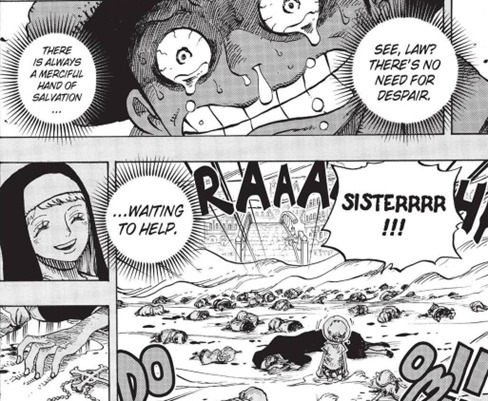
Seeing hell, knowing why and how it transpired, who were responsible (spoilers, the World Government; the same body that most citizens believe exist to protect them — yeah, sister "a merciful hand of salvation waiting to help" were perhaps the worst possible combination of words you could have left Law with here. Likely instrumental in having him lose his faith "I don't believe in anything anymore."), knowing he is the only survivor, and fated to die anyway due to the terminal illness that is slowly killing him because some figureheads years back were greedy and the governing powers above the figureheads were willing to cover up everything if it meant garnering a portion of wealth and maintaining influence and control. It's beyond grief, beyond rage. And there's absolutely nowhere Law can put it. No one he can retaliate against. Who could come out of hell knowing this and not want to see the world burn?
So, smart little Law escapes under a pile of bodies and goes to the one person infamously revered for being in the business of that kind of thing. And boy oh boy I can only begin to imagine how a young and impressionable Law - fresh from a genocide, with a hole in his heart and a hatred for everything still alive - had his concept of love warped whilst surviving those two years around Doflamingo and his family. A family where members are only welcome so far as they are useful to Doflamingo and his aspirations. Of course Law's going to pick up some fucked up ideas about how love works outside this little white fence he grew up and watched burn down.
Then. Enter Corazon.
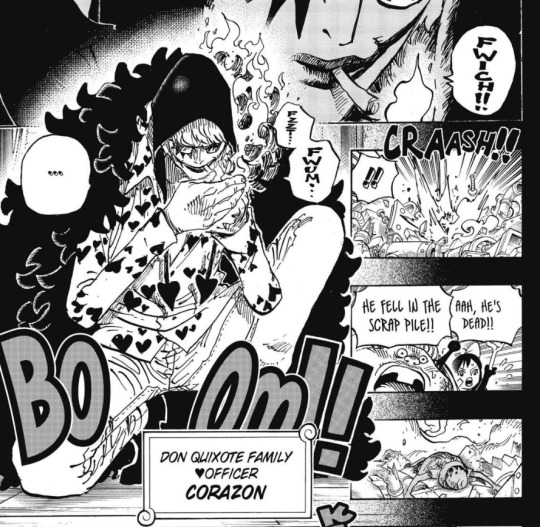
Their relationship may begin on shaky legs (near-juvenicide via defenestration in a failed attempt to ward Law away from sticking around) but Corazon quickly becomes the one person in the world Law can trust and rely on again. And Rosinante can only do so much in terms of healing and guiding this broken kid (yes, his position both as Doffy's brother and as a double agent made things difficult, but need I mention he was only 26! 26 when he died!) but he showed Law kindness and compassion when he was at his lowest. He had faith in the existence of a cure that Law was long past believing. Was determined to help him, even against Law's wishes, even if it meant having Law relive his trauma over and over again. Corasan becomes incredibly important to Law, giving him a reason to live beyond just destruction and revenge.
After the rest of the world had long turned his back on him, when he had been nothing but a dying puddle of rage and self-destructive nihilism, Corasan saved Law. He told Law "Aishiteru" - a very rare way of saying "I love you", never used casually due to the depth of its meaning and the massive connotations behind it - in essence translating to "I love you so much I cannot possibly imagine life without you". There's a high likelihood that at his age, Law had never heard these words before, and probably didn't quite understand the weight of Rosinante saying it at the time.
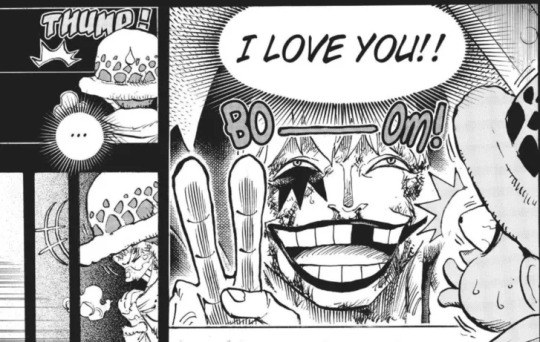
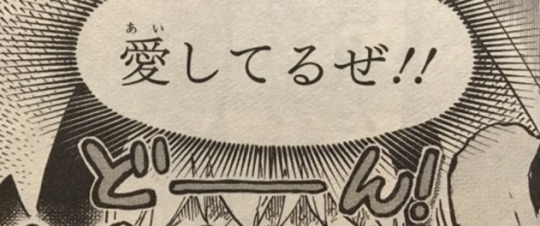
Corasan frees Law, then he dies at the hand of Doflamingo, Rosinante's own brother.
All Rosinante wanted was for this poor kid to go on and live his life unburdened by his more than turbulent history and his connection to Doffy, but I think for all his planning, Rosinante's one critical error was well and truly underestimating how much him loving Law, and loving Law to the extent he did, would mean to that kid. Law really went from that ten year old hollow void sentiment of "why does anyone or anything at all get to exist when everything that was important to me is dead, burned to ashes and wiped off the map" to "I should have died at age thirteen and every second I've lived since then, I've only lived as a result of Corasan's efforts and as a personal affront to Doflamingo." This time, Law has a tangible, heinous 10 foot monster of a target to direct 1. his grief and anger and 2. justice for Cora towards, and this time he has the power and will to follow through. More than that, he believes Corasan sacrificed himself for him because he's a D. (someone destined to rain down destruction on the gods - Doflamingo, in this case). Corazon becomes a saint that Law dedicates the rest of his life to. Which is something that Law is not vocal about to just anyone he comes across, but is so unbelievably obvious once you know what you're looking at — his tattoos, his jolly roger, his crew, his ship, his ambitions, his beliefs, his fucking. custom-made Corazon jacket. all of it for this man that showed Law - at a time when he hated the world and everything in it - love. For all of six months. max.
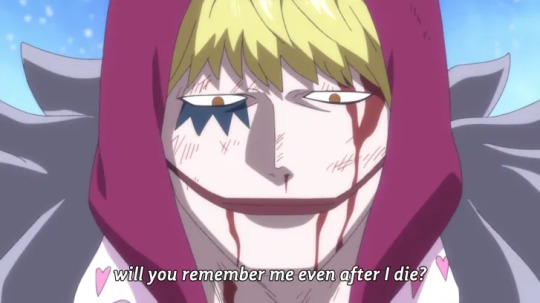
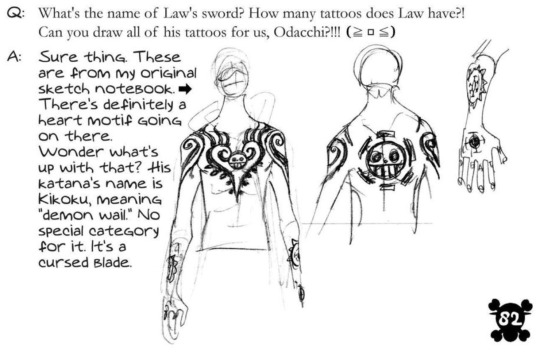
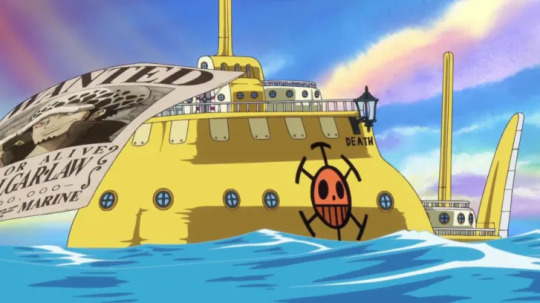
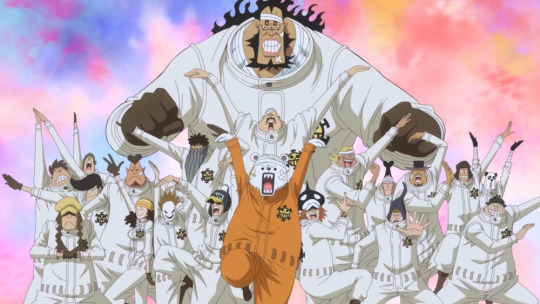
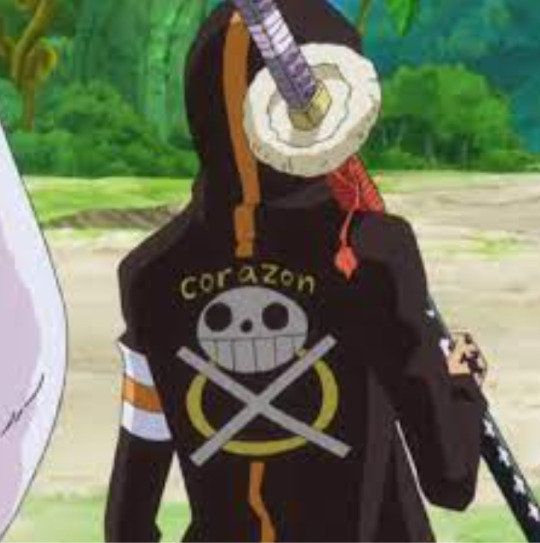
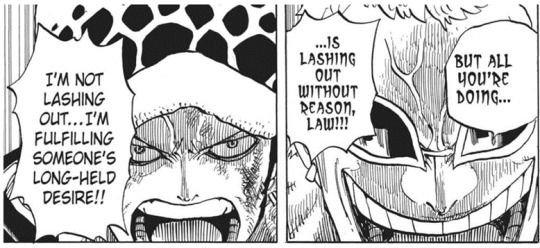

And his whole life and personality and behaviour CONTINUES to be guided by this trauma — the way he's reckless with himself, his borderline self-destructive actions, the way he keeps telling himself that none of it would've been worth it unless Corasan's last wishes are fulfilled, the way he surrounds himself with bright people and soft things, the way it doesn't register that his crew genuinely loves and cares about him, the way he's terrified of losing anyone important to him again (and I would say this is one of his biggest downfalls as a Captain compared to someone like Luffy - who is just as reckless as Law is but trusts his crew, doesn't try to send them away, isn't afraid to let them grow and risk their lives for him like Law is with the heart crew), his inability to take a damn compliment. The way he doesn't understand Luffy AT ALL.
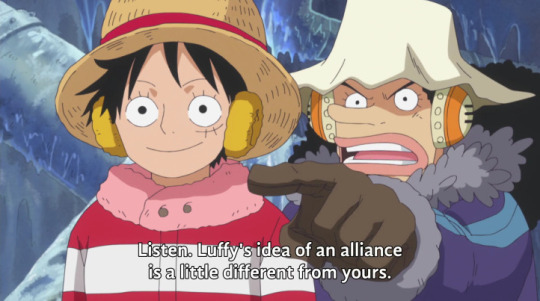
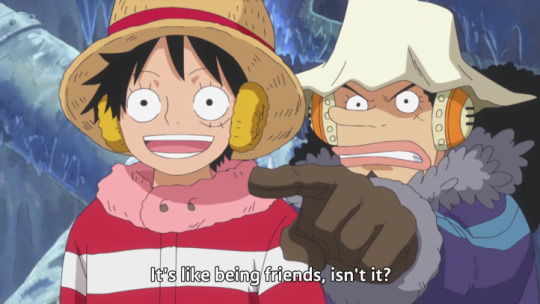
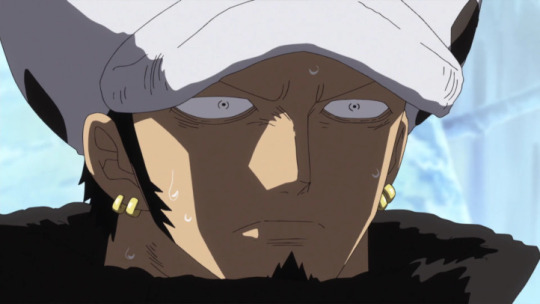
Doesn't understand that this alliance that he's brokered means nothing to Luffy because he sees him as FRIEND. No transactions or mutually beneficial pacts necessary. Doesn't get that he's the one that inadvertently asked Luffy to be his friend, thus breaking a long chain of people (mostly parental figures and siblings) abandoning or leaving Luffy behind/no one taking the first initiative to ask to be around him. Law is complete and utterly in the dark as to why someone would ever bat for him when the stakes are this high for no other reason than because they like them and care about them as a person.
Luffy, with his playground rules where he loves unconditionally and will take on the world for a friend he made five minutes ago, perplexes Law with his sheer simplicity.
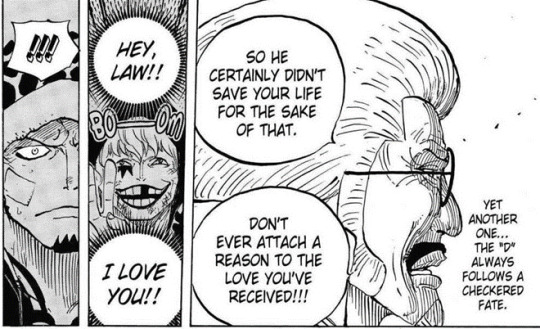
When Sengoku tells Law, "Don't try to find a reason for someone's love", I do NOT think he takes it well. Because there must be a reason. There has to be. Between the two options of Corasan saving Law's life and freeing him because he believed in the will of D., or Rosinante saving him for no other reason than because Law was a kid that was loveable, and because he loved him unconditionally... everything we've learned about how Law functions up until this point suggests the former will always make more sense to him, and after everything he's been through, is most likely less painful for him to accept.
#LONG POST#in this essay i will... oh no. this was a spiral i was not ready to go down.#I'm not doing okay btw#one piece meta#these were originally 2am tags but upon reflection i thought it should probably be its own post#CJ's op watch-through#one piece#op#trafalgar law#trafalgar d water law#corazon#corasan#donquixote rosinante#monkey d. luffy#lawlu#dressrosa spoilers#op meta#op analysis
398 notes
·
View notes
Text

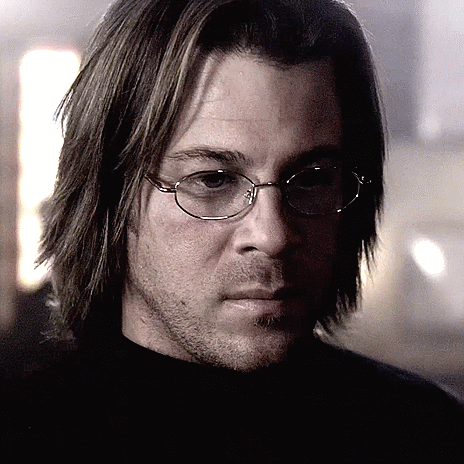


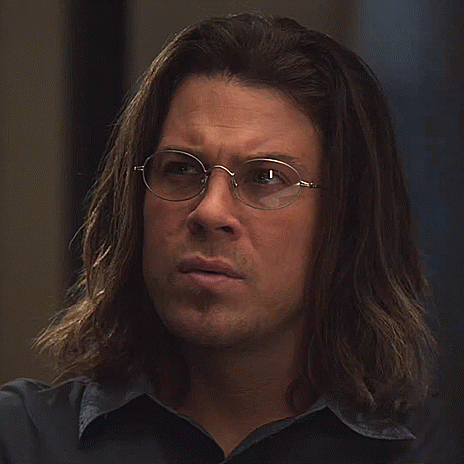



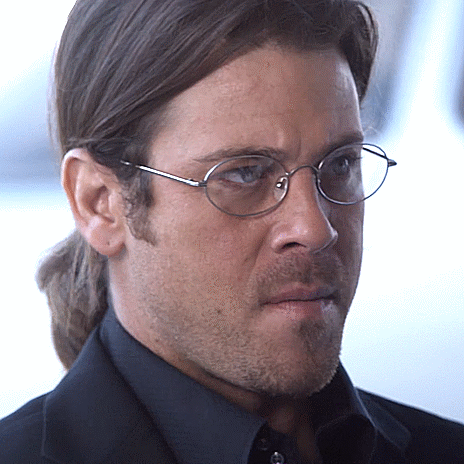
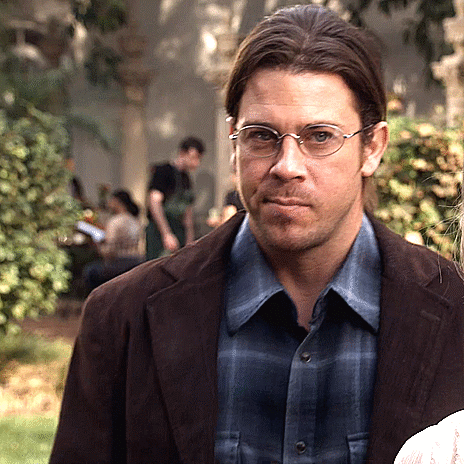
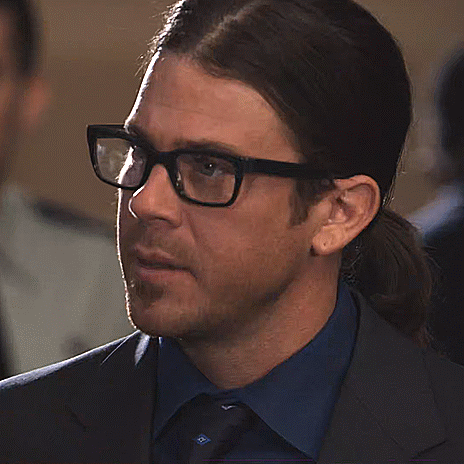
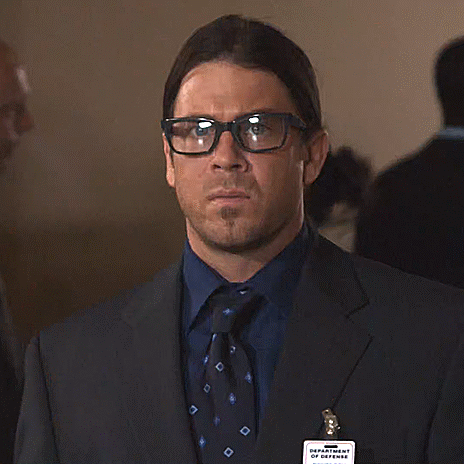
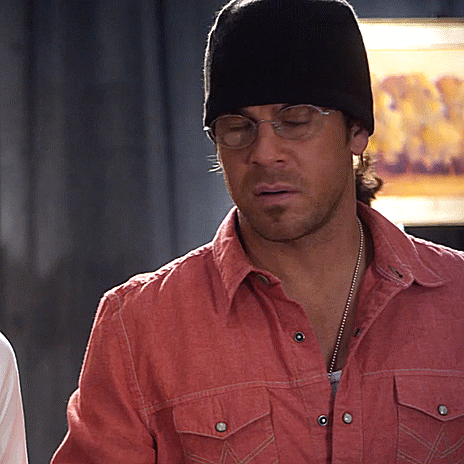

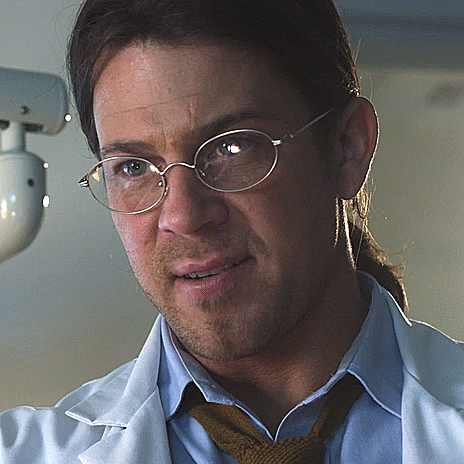



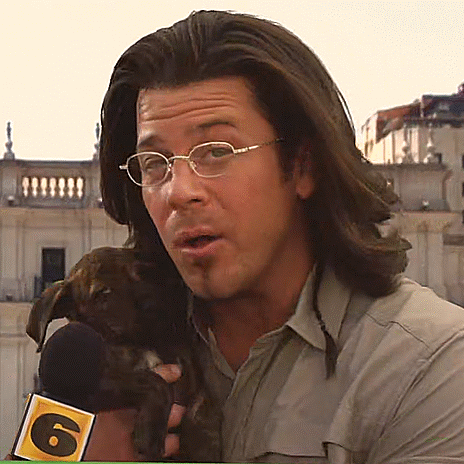




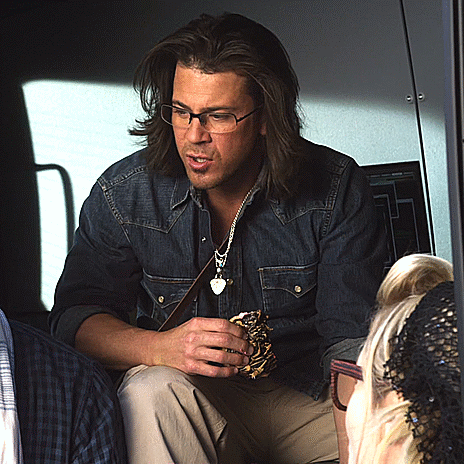
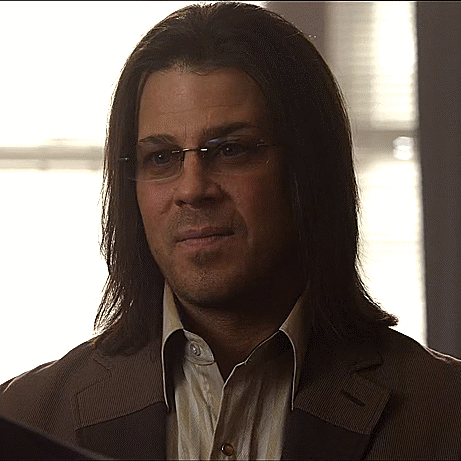


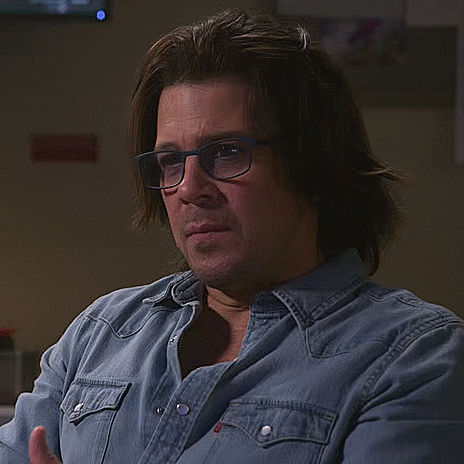
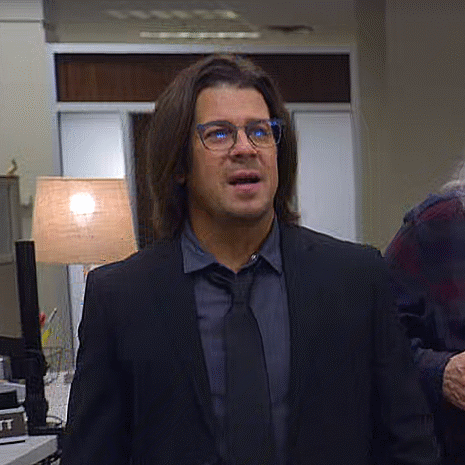
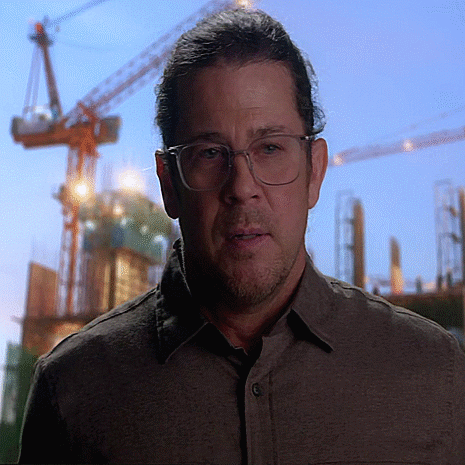
Eliot in glasses compendium.
(Jake)
(Alex)
#leverage#leverage redemption#eliot spencer#christian kane#this guy in glasses#yes please#the detail that he originally wore them because he needed them got lost along the way#somewhere after the new glasses line from jailhouse job#although he did wear them again for reading purposes once in redemption#i mean canonically he probably wears contacts#cause getting punched wearing glasses sucks#but also consider that this is the reason why he's always scowling in redemption#he's not grumpy he's squinting#because he's too stubborn to go and put his glasses on#yeah he needs to wear them more in redemption#tag essay#long post#ghostly'sgifs
412 notes
·
View notes
Text
Quotes from Kieran that straight-up sound like Shakespearean love poetry: a comprehensive list
‘None may touch me. None but you.’
‘What is left of my heart belongs to you. When you leave, it will shatter anew.’
‘Tell me I did not hurt you.’
‘How am I expected to pass another century without the taste of you on my tongue?’
‘After so many decades spent hating each sunset, knowing nightfall would take my freedom from me... I began to yearn for the moonrise instead of cursing it. Because dreams of you might be waiting on the other side.’
‘I would rather be cursed to roam the wilds as a beast every night than live endless lifetimes without you.’
‘Wherever it is that souls may go, you will find mine waiting for you at the end of all things.’
‘You shall pay dearly for every spilled drop of her blood.’
‘I was not lying. Were you?’
‘Just this once, beloved... I wish you could not lie.’
‘You hold all of my heart, beloved. Now, and always.’
‘I would make and unmake the world for you, beloved.’
‘Believe me when I say I want every part of you. Every version. Now and future.’
‘Look, beloved. Your skin is a canvas covered in stars.’
‘If I were you, I would begin by thanking her and throw yourself on her continued mercy. Because you’ll get none from me.’
‘What would be the point of immortality without you?’
‘No magic. Like an everyday mortal.’
‘Insult her again, and I will carve my refusal into your flesh, so that you may never forget it.’
‘I don’t care what your title is. Every breath, every beat of my heart belongs to you. You are mine for life.’
‘Thank you… for sharing the sky with me.’
‘If you lay a single hand on her, there will be nothing left of this place but a hole in the ground.’
‘Let us live in this moment long enough that I may love you the way you deserve.’
‘I will let nothing separate us… I shall always find you. Your heart calls to mine in a language beyond words.’
‘For you I would set worlds aflame, tear the sun and moon from the sky. I did not live before I met you.’
‘Perhaps you are the most courageous of all, for choosing to live among us. A mortal among gods.’
‘Welcome home, beloved.’
‘You helped me find peace in my grief. I will always help you find peace in yours.’
‘You sacrifice too much for me, beloved.’
‘I cannot give you my heart. It already belongs to someone else.’
‘There will always be tasks vying for our attention. But you are more important to me than any of them.’
‘I like being in here. I always want you to have the freedom of a place to call your own… and it means everything, that you welcome me in.’
(And finally, BONUS: Quotes from *other* characters in The Cursed Heart that straight-up sound like Shakespearean poetry, because the writers of this book just do. not. rest.)
‘I know you. I’m not afraid.’
‘I love him so terribly, it hurts.’
‘You are so much stronger than you know. And a love as strong as this is worth fighting for.’
‘Even if you kill me, I’m glad I met you. Because you deserve to be happy. You deserve to be loved. And I will love you until my very last breath.’
‘The world is rarely gentle to those who are so kind. It is you who must be the strongest of all.’
‘What do you want with that cursed thing?’ / ‘To cut the Sun and the Moon from the sky.’
‘Anything here that wishes to eat me had best prepare to choke.’
‘I know you. And I love you. Both your darkness and your light.’
‘You are everything I want. Just you. Just like this.’
‘If love could forestall death, we would all be immortal.’
‘All stories end. Even ours. That’s what makes them beautiful.’
‘I don’t care where I sleep, so long as it’s beside you.’
#UPDATE: the series is finished and so is this list#and i am so so sad to say goodbye to it#but what a journey it’s been#playchoices#choices: stories you play#the cursed heart#kieran x mc#prince kieran#fandom essay#original post#prev tags:#i went back through every screenshot i’ve ever posted to make this list#and i will continue to review every screenshot i ever take#and it was and will continue to be worth every minute#this book deserves an award
237 notes
·
View notes
Text
the great thing about falling really deep into a new media niche is developing opinions on many new things. the terrible thing about falling really deep into a new media niche is developing opinions on many new things
#fjdkfdjkfd.#anyway. last week a trailer came out for something only called kidnap. which is hilarious because that's a blocked tumblr tag#it's a romance (with the kidnapper. who is secretly only doing it to pay a medical bill). i don't think it sounds or looks very good#& considering who is airing this and their history with Edgy Content the keyword here will probably be Bland. or maybe Toothless#but unfortunately...... tragically...... one of the leads is an actor i'll take in literally anything.#so i've spent my week periodically being attacked by this insignificant bit of knowledge and experiencing shrimp emotions#literally just. going about my day. thinking 'kidnap'. going OOF. then remembering i'm in the middle of brushing my teeth#also. i found out the original writer of bad romance & together with me is ALSO the writer of not me. and it's things like this#that would take like. twenty layers of explanation of these properties in general and also my takes on them specifically#and how it contrasts or aligns with their general perception. to even come CLOSE to explaining the mental hit i took from that#i need a corkboard and some red thread. and then probably three more corkboards#for day 1 that is. i think i have a week's worth of loosely connected spontaneous deep dive video essays i could do off the top of my head#ah well. the curse of having interests#*
64 notes
·
View notes
Text
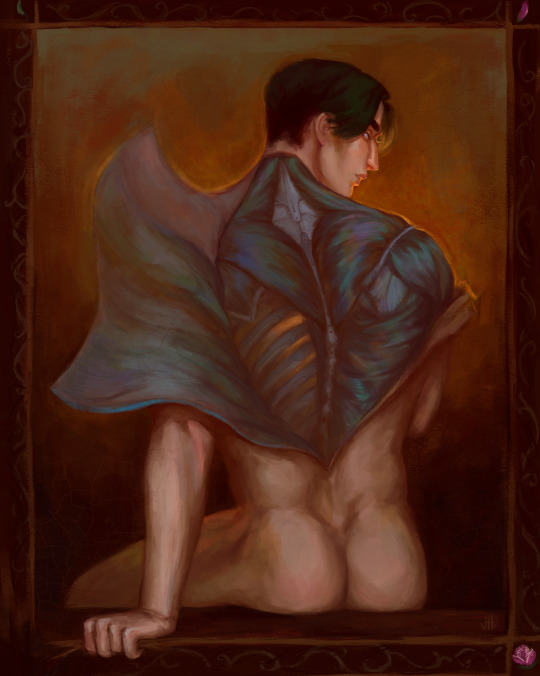

Did he who made the Lamb make thee? - this is heavily referencing Jacques Fabien Gautier d'Agoty's "Anatomical Angel" illustration, it's also inspired by William Blake's art, specifically "The Great Red Dragon" and his poem "The Tyger"
#art#painting#original character#artists on tumblr#wolfgang#artistic nudity#id in alt#happy peeled wolfgang wednesday once again!!!!!!§#very happy to have this finished!!#i will be smart and not write an essay in the tags abotu this and instead write a separate post so look out for that#i know the tyger is like lit 101 but ive always really loved the poem and the progression of it. it just stuck with me for so long#robot fuckers i hope you find this
183 notes
·
View notes
Text
I used to be one of those guys when I first joined the Kirby fandom, but everytime I hear a discussion of the series writing that starts with "So the Lore is InSaNe-" and not like, "Kirby has a fun writing style that takes advantage of its cute exterior to tell cool stories that reward player's curiosity and leave lots of room for imagination-" I cringe so goddamn hard.
I kinda just hate that people approach things that encourage investment when they don't expect it as inherently absurd. Like it is fun to joke about how absurd Kirby lore can be, but it really often comes with an air of disrespect or exhaustion rather than like, appreciation that these games are made by people who want to tell interesting stories when they could easily make as much money just making polished enough fluffy kiddy platformers. And when it's not met with exhaustion, it's met with - like I said before - that tone that it's stupid for a series like this TO have devs who care about writing stuff for it. Which is a whole other thing about people not respecting things made to appeal to kiddie aesthetic or tone.
Maybe the state of low-stakes YouTube video essays just blows cause people play up ignorance and disbelief for engagement, but like I STG I hear people use this tone for like actual narrative based games sometimes. Some people don't like... appreciate when a game is made by people who care a shitton in ways that aren't direct gameplay feedback. And they especially don't appreciate it when it comes from something with any sense of tonal dissonance intentional or not.
Anyways, I love games made by insane people. I love games made by teams who feel like they wanna make something work or say something so bad. I love that energy, especially when invested into something that could easily rest on its laurels or which obviously won't be taken seriously. I love this in a lot of classic campy 2000s games, I love this in insanely niche yet passionate fanworks, and I love it in the Kirby series and its writing. Can we please stop talking about it like it's an annoyance or complete joke?
#shut the heck up#kirby#kirby lore#fandom#midnight rambles#im quite talkative today cause my rambling bestie is busy#im also bitter cause im too burnt out to make the things i want to properly express my adoration for this series#but i can waffle about it ig#ive been relying on prose and essay ro express myself a lot in leiu of my usual creative outlets...#i always wanted to make a video edsay series about kirby lore with this expressed ethos#maybe i should just start with essay-essays somewhere#still need to replay all the games for that first though#more streams coming up eventually i swear#tag talking#i read a cool analytical article today that had the same tone as a video essay and i was like 'ah thats the origin of the essay part'#so now i wanna explore that world more of article game and media journalism and such
174 notes
·
View notes
Text
It’s not unheard of that, in the USA, a chunk of rich kids get into Ivy League universities because their parents donate large sums to the school to ensure their kids get admitted… and a lot of the time the kids don’t even know that their parents “helped them”. Knowing that,
No option that neither did and only one knows cos like, we all know they’re not keeping that to themselves for thirty years lmfao
(If you aren’t aware of the standard of US Ivy Leagues, in short they are the most prestigious universities in the country and require almost perfect grades/test scores as well as multiple extra curricular activities or title positions in high school and a strong written essay in order to be admitted)
#if you choose one of the split options pls lmk in tags if you think the other knows#(eg Dennis got in on his own Dee didn’t and Dee doesn’t know do you think Dennis is aware ?)#personally I think neither got in on their own merit (solely) and neither knows#MAYBE Dee got in cos her college essay about her back brace was super moving or something… maybe#but Frank def donated a hefty sum to make sure his kids looked good on paper#I do think they both had good grades relatively#but probs had some legal screw ups/misconduct in hs that hurt their applications#and they didn’t have many extra curriculars outside#of drinking and smoking and what not lol#they maybe had an original good path but teenage debauchery screwed up the latter years#sunny polls#iasip#trash twins
48 notes
·
View notes
Text
im not fucking around anymore. here's the full "Paul is Care" essay i've been working on:
“Alright. So there's uh, nothing out here, as far as I've seen. But actually, I think there is something out here. I just haven't seen it yet.”
In Petscop, the story is told between the lines. When you feel like you have a grasp on it, a single colour or date throws off everything you’ve built up. That’s why I like to look at Petscop in another way; not as a series of events, but an exploration of a single character: Paul.
Some people like to map everything out in a single timeline; when did Care go missing, when did the family get the game, when did Lina and Mike die. I think that every interpretation of Petscop has its own value, because Petscop means something different to everyone who watches it. But, when I look at Petscop, I don’t just see a series of events wrapped up in the mystery of Care’s disappearance. I see a video game used as a device to explore and understand the connection between the past and the present. I see the ways in which Paul Leskowitz is Carrie Mark.
I know that to some that notion might seem crazy; the broader discussion of Petscop is different to the niche ones held by crazy people in the tags of a Tumblr post . Obviously, this theory is personally significant and I hold it very near and dear to my heart. But, I want to share this theory in a way that makes sense to the general audience of Petscop because I genuinely believe you guys are missing out! So, keep an open mind and enter my Petscop mind-palace…
“...were signs along the way. Um, that I ignored. Because it would have been a completely ridiculous idea to me. Um. But when I found my room, it made, uh, well, I was shocked at first, but it made sense, especially considering where I found the game in the first place, um, that it would be tied, in some way, to me through you. Um. And I'm trying to think, when was the last time I saw any of you at all? It had to have been in like, 1999. I was a kid, I was a small kid. Tiny kid. Um. And after that, just, you know. But, it would make sense in the timeline.” (Petscop 11)
A lot of Petscop theories surround the actual textual proof found in the videos, so that’s where I’ll start. There’s many instances where Paul makes the connection between himself and Care, but one moment continues to stick with me. In Petscop 11, Paul finally enters the house and takes a look around. He’s on the phone with someone, presumably Belle. Paul goes up to the calendars and starts talking about Care, “Yeah, on that topic... I don't remember meeting this girl at all. Um, I don't remember knowing her at any point (…) Um, and I remember you saying that we were, that we, we are, um, exactly the same age.” (Petscop 11). He points out that he and Care share the same birthday, down to the year. We get further confirmation of this in Petscop 14, when Paul’s conversation with Jill that he had on his own birthday is superimposed onto Care’s. The next part though, is what really gets the theory started, “I do agree there's a resemblance. Um. Very strong resemblance between us.” (Petscop 11).
Faces are incredibly important in Petscop. Marvin thought Care and Mike could be rebirthed into Lina because they had similar features, and Care had to be given Mike’s eyebrows specifically to change her room. So, for Paul and Care to have such similar facial features that someone else pointed out the resemblance is significant.
They also happen to share the name “Leskowitz”, which is both Anna and Lina’s last name. We know this because his Reddit account is “p_leskowitz”.
If he’s a Leskowitz, then that explains his complicated feelings towards “the family”. “The family” is a foreboding presence throughout Petscop. Their meddling isn’t outright malicious, but even Paul admits that he’s intimidated by them. And it makes sense, as “the family” (comprised of Anna and Jill) each have a major role in the core mystery of Petscop. Anna is the mother of Care and the wife of Marvin, while Jill is Marvin’s sister and the mother of both Rainer and Mike. To be a Leskowitz, Paul would need to be blood related to Anna or Lina in some way. Paul shows that he has this relation to the family in Petscop 22, when he’s talking to Belle about finding the windmill, “And, I don't th- and you don't have to worry about it, right, 'cause... 'cause you aren't, you aren't family, so you wouldn't... have a room, that's the thing.” (Petscop 22). In this context, Paul is asking Belle whether Jill has contacted her. When he tells her she doesn’t have a room, this is in reference to the Child Library explored in Petscop 3 and 7. This means that in order to be part of the Leskowitz-Mark family (and in our case, related to Care), you have to have a room in the Child Library, something both Paul and Care possess.
Paul being related to the family is also supported by his casual mention of meeting Rainer as a child, “‘Rainer’... I saw him at a birthday party once. All the older kids were down in the basement playing video games, to hide from everyone. He was down there, too. He was older than the rest of them, though.” (Petscop 11), and his confusion of not knowing Care, with the implication that if she was real, he would have met her through the family.
A rarely discussed aspect of Paul’s character is that he can’t tell his left from his right. When he’s doing the disc puzzle in Anna and Marvin’s room is Petscop 11, “Um, we can see what the room looks like in that recording, um, on the uh, right? ... Left? Left? Right ... side.” (Petscop 14) and before he even enters the house, “And, I mean, I still get confused about that. Because, I mean, well, I know it's always the top, but, um, I still have to think. I have to think.” (Petscop 11), we can clearly see that he has trouble with directions. In a similar fashion, Care is described as “dizzy”, most notably in the end credits of Petscop. She is also described as blind by Rainer in Petscop 17, “You were blind. At some point, your movements stopped making sense.” (Petscop 17). In the counsellor’s office, the counsellor says to Paul, “Are you right handed, or left handed? You don't know? Really?” (Petscop 22). I’ll get more into it later, but this sequence is presumably a real conversation that the game is recreating. If this scene is taken from Care’s real childhood, then it confirms that she also had problems with her lefts and rights.
Now, this is the base level of the theory. It’s easy to figure out that Paul is a Leskowitz, he literally calls them “the family”. And while I think the bits about faces and birthdays and directions are significant to this theory, I wanted to get all of the textual evidence out of the way so that I could get into the fun part of this essay: the subtext.
”Some things you can't rewrite.” (Petscop 14)
Petscop is nothing if not a collection of symbols and metaphors. Ask me what Petscop is all about on any given day and there’s a non-zero chance I will start explaining why the car is orange. While it is necessary to analyse Petscop as a real series of events, I think that another approach can be taken; what if we analysed Petscop as a series of events that are happening to Paul specifically? That the game is creating meaning by placing Paul specifically in these snippets of the past. By looking at each moment as “Why did the game make Paul do this?” instead of “What is happening in the game?”, we can see everything through a new lens.
First, I want to discuss colour. Colour plays a huge role in Petscop; almost every character is assigned their own colour. This is most often used to denote who is speaking in text, but it’s also used for other things like the tool. You are probably aware that Care’s colour is yellow, as all of her text is yellow. What you might not know is that Paul’s colour is red. Paul has exactly one instance in all of Petscop where he has coloured text and that is in Petscop 22, when he gives the counsellor his name. The calendars in the house are also colour coded, as the one showing 2017 is red.
One of my favourite moments in all of Petscop uses colour in a way that supports this theory perfectly. When Paul takes Care out of the rebirthing machine, she has been transformed into an Easter egg. A red and yellow striped Easter egg. I will get into this egg later on, but for now, I want to point out how Paul and Care’s colours have been used here. Of course, it’s significant just that they've been put together, but it's more than that. Care’s final form, the egg she has been placed in to keep her safe from all of the trauma she has suffered, that she will spend the rest of the series in, is painted a combination of her and Paul’s colours. In the same sequence, when Paul is playing the Needles Piano for Care B, the “wrong” notes he plays to turn her into the Easter Egg are all red. There’s a joke about eggs and transness in here somewhere.
Right after Care’s rebirth into the egg, Paul places her in the locker with the purple egg and the “new life” letter. If we abide by the established colour theory, this second egg would be Belle’s/Tiara’s egg. By putting them together, alongside the letter, it symbolises Care and Belle’s transfer to Lina’s care; this can also be supported by the ending of Petscop. In the final scene of the soundtrack, Belle recounts when she and Paul were adopted, “There is Boss waiting for her son. Pall do you remember being born. Smuggled away driving to your new house. Boss in driver seat me in back.” (Petscop Soundtrack). “Do you remember being born” is a question posed over and over again throughout Petscop. It’s meant to be a reference to rebirthing, but here it’s Paul being asked if he remembers being born, not Care; you can also connect this to the “new life” letter, making it apparent Belle is asking if he remembers when he was given his “new life” with her and “Boss”. There’s also the implication of the wording “smuggled away”, implying that there was something stopping Paul from being taken to his new home. Paul and Care’s final scenes parallel each other; Care is placed with Belle’s/Tiara’s egg with the “new life” letter, while Paul is taken back to “Boss” by Belle. Care and Paul are both asked if they “remember being born”.
Another, smaller piece of colour theory in Petscop comes from the board games in the counsellor’s office. The board game “Accident” features red and yellow puzzle pieces that fit together, but are broken apart. Remember that Care’s colour is yellow, so assume that she symbolises the yellow piece; Paul’s colour is red, so assume that he symbolises the red piece. The red piece is bigger and fits into the smaller yellow piece, like it’s missing the beginning of it. The yellow piece comes before the red piece, as if it adds context to the red piece. When we think of this in terms of Care and Paul, we can see that Care is the “missing piece” of Paul; the small part of his past that adds the context that completes him. Paul’s piece is bigger because he’s been Paul for so much longer (if we interpret the counsellor’s office as a real event the way it is shown, then that could be the moment he changed. Or, if we consider Care’s rebirth into the egg as the moment Care turned into Paul, then that would be the moment instead), meanwhile Care’s piece is small because she was only a small part of his life.
Taking colour into account, we can get into the meat of the symbolism in Petscop. When we view the events of Petscop through our new lens, many things become significant. Paul is placed in the role of Care many times throughout the series; on Care’s birthday, in the counsellor's office, and in Rainer’s “you are Carrie Mark” monologue.
During the “strange situation” birthday scene, Paul carries around a yellow balloon, symbolising that he is standing in for Care. This is further cemented by Anna’s dialogue addressing Paul as if he is Care on the day she came home, “You made it. Happy birthday! (...) Why are you covering your face? (...) Of course I recognize you. Those eyes. That nose. That’s still you.” (Petscop 14).
This next dialogue from Anna is particularly interesting to me; she doesn’t just tell Paul that she’s happy Care is home safe or ask him where she’s been, but instead she says this, “I sure hope you’ve realised by now. It doesn’t matter how long you’ve been gone. It doesn’t matter how much you’ve changed. You aren’t lost. Stop wandering and come home.” (Petscop 14). When we talk about Petscop, we have the urge to deny any supernatural involvement in the story. Whether through AI or predictive programming or alternate timelines, we want Petscop to be plausible. Understandable. Easy to digest. But, we often forget that Paul poses the question of a literal “ghost in the machine” in the first few episodes. I want to consider this quote– Anna talking to her child who has been “lost” for many years– as an act of this ghost. The game is talking back to Paul, telling him that no matter how much he has changed, he still has the same eyes, the same nose that made him Carrie Mark. And we know how important eyes and noses are in Petscop. Also as a side note, consider how Anna didn’t specify eyebrows; we know that Care’s lack of eyebrows is in some way due to Marvin, but when she tells Paul she recognises his eyes and nose, she doesn’t add on eyebrows. Paul said it himself in Petscop 7, “Um, and why am I doing that? Well, because eyebrows seem to be important.” (Petscop 7). I like to think that she couldn’t have said that Paul has the same eyebrows because, since Marvin isn’t in the picture anymore, he wouldn’t have any reason to pluck them.
Another scene that mixes up Paul and Care is the counsellor's office. When Paul finally enters the “girl wall” in Petscop 22, he is placed into a school’s counsellor’s office. Again, they talk to Paul as if he is Care, apologising for taking him out of class and saying he needs to “catch up”, implying that he’s missed a significant amount of school. As they start to play Graverobber (Jesus Christ, Rainer), the counsellor is confused about Paul’s name; they ask him if they have the wrong name written down, as his save file is currently “Strange Situation” and when they called out the name on file, Paul didn’t respond. Now, the connection here is a little more nuanced, but it still comes to a conclusion that I think greatly supports the theory. “Strange situation” is in reference to the Mary Ainsworth Strange Situation Experiment, a test in which an infant is deliberately separated from their mother to test their level of attachment. This is a very base level understanding of this concept, but when applied to this specific scene, it becomes apparent that this “strange situation” is another reference to Care. Care was separated from her mother for about half a year, only returning during the birthday party scene; the counsellor’s scene was accessible once Paul started using the “Strange Situation” file. Care stopped recognising the name she used before the seperation, considering herself to be “Strange Situation” instead. She has literally stopped recognising the name Care, and picks out her own name (which in the game Paul sets to his own).
Also consider the implication of the “girl wall”. At first, it’s an absurd joke, meant to lighten the mood using the same roundabout humour the rest of the series has. But, the counsellor asking if they have the wrong name, listing Paul as “Strange Situation” instead of his name, combined with the fact that when Paul is placed in front of the girl wall, he can’t walk away from it, it becomes a bit of an analogy; The game keeps forcefully showing Paul the word “GiRL” over and over and when he finally enters the “girl-world” as Strange Situation, he is called the wrong name and once again placed in Care’s shoes.
Let’s revisit the “ghost in the machine” idea. In Petscop 17, we are shown a past recording of Petscop; we never find out who was playing at this time, but it’s easy to assume Paul is the one watching the recording. The footage is less interesting than the dialogue, but it is notable that it’s a recording of the player running backwards in a very deliberate pattern. The actually relevant part of this sequence is Rainer’s monologue; in particular, the way he frames it, “You are a girl named Carrie Mark, and you were born on November 12th, 1992. You have a mommy named Anna, a daddy named Marvin, an auntie named Jill, an uncle named Thomas, a cousin named Daniel, ......I know what you must be thinking. Have these statements always been true? Or have I cursed you? Is there such a thing? A curse that changes your past?” (Petscop 17). There’s something about the forcefulness of this dialogue, “You are Carrie Mark,” as if Rainer is trying to make it so just by saying it. The inclusion of the birthday is also notable; we have been shown time and time again that Paul and Care share a birthday, and that this is an important part of both of their characters. So, when Rainer asks if these statements have always been true, or if it’s “a curse that changes your past”, we’re meant to interpret it as such: some of the statements are true, but the “you” being addressed is not currently “a girl named Carrie Mark”. Rainer casts a spell to make the player retrace their steps and although he might not be playing, the use of the word “you” and present tense language makes the statement pointed towards Paul. There’s something to be said about Rainer’s position in all of this; he isn’t the only tangible “ghost” in Petscop (Marvin and Tiara fit Paul’s definition established in Petscop 6), but he’s the only one to be fully dead. It truly feels, in this moment, like Petscop– like Rainer– is talking directly to Paul. The “curse that changes your past” is the part that ties it all together. This past that Paul doesn’t fully remember, where Anna and Marvin have a daughter named Care, where someone in his family went missing for months– by learning about this through the game, Rainer is essentially changing Paul’s version of the past. Your memory and physical evidence are all you have of the past; when your memory tells you one thing, but physical evidence tells you another, what version of your past is true?
“You’re the Newmaker. You can turn Care NLM into Care A, and close the loop.” (Petscop 9)
Finally, I want to explain why this theory is supportive of the themes of Petscop. Of course, there’s the obvious link between rebirth and the change from Care to Paul. But, there’s also themes of blood family versus chosen family, breaking the cycle of abuse, and of healing from your past. I want to provide an explanation of each of these themes and how the “Paul is Care” theory fits into them.
Let’s begin with the family point, since I already expanded on the family’s role in Petscop earlier. There’s a story behind the scenes in this series; the conflict between the chosen family versus the blood family. Anna and Jill against Belle and Lina. Anna and Jill are restrictive– they take over the channel and block certain things from the audience. Paul admits that he’s intimidated by them, and he’s concerned when he thinks Jill could be in contact with Belle. When we get the only dialogue from Jill, Paul is hostile and aggressive with her, something we don’t see from him otherwise. Alternately, Anna comes off as dismissive in most of her dialogue; when Care shows up at the birthday party, Anna treats her like no time has passed, like they haven’t been searching for her for months. We don’t get direct contact between Anna and Paul (except for a phone call in Petscop 11 that you could interpret as being with Anna), but the way she talks to the player through Care during the birthday party is still dismissive, “I sure hope you’ve realised by now. It doesn’t matter how long you’ve been gone. It doesn’t matter how much you’ve changed. You aren’t lost. Stop wandering and come home.” (Petscop 14). There’s a level of distance between Paul and the family, which is evident from the name alone; Paul identifies himself as part of the family, but he still calls them “the family” as opposed to “my family”. When you pair that with the fact that he calls them all by their first names instead of any term of endearment (like how Rainer calls her “Auntie Jill” in his spell), it paints a clear picture: Paul does not want to be part of this family.
In direct contrast, Belle is shown a significant amount of affection from Paul. Not only is he on the phone with her for a good handful of the episodes, but Belle also has a familial connection to Paul. In Petscop 2, Paul is talking to Belle and he says “When you come home next month, and uh, hopefully you're feeling a little more enthusiastic about that now, we can investigate this together, and maybe you'll find stuff that I can't find here.” (Petscop 2). I think the casual use of the word ‘home’ to describe where Belle is staying implies a certain closeness, maybe even that they live in the same household. That’s not the part of this line that is important to me, however. Take a look at Belle’s final speech at the end of Petscop; Belle says “I could not wait too be your friend,” and Paul responds, “Family”, to which Belle says, “We can investigate this together.” (Petscop Soundtrack). After distancing himself from the family, as well as directly telling her she’s not part of the family (following it up with “Uhh... I didn't- I didn't mean it that way,” (Petscop 22), implying they have a similar connection that she’s defending), Paul calls Belle family. She states that they’re friends and Paul corrects her by telling her that they’re not just friends, but family. The most gut wrenching part of this dialogue is the use of ‘we can investigate this together’. It’s like a ward, a promise that Belle is making to Paul. He doesn’t have to go through this alone, she’s promising to be there for him. She’s going to investigate this with him, like he asked her to in the second episode. Paul doesn’t call his blood relatives family, but he tells Belle that they are his family; her and the “Boss”.
How does this connect to Care? It’s not hard evidence, but when you take this theme of family into account, it makes more sense for Paul to have a strained relationship with the family if we apply Care’s story to him. Think about it; Paul was ‘smuggled away driving too [his] new house’ and he hasn’t seen the family since he was a child, and Care’s egg was (metaphorically) placed with Belle’s and the New Life Letter when she would have been around 5, since that’s the age she was when she was kidnapped. Care went through an extremely traumatic event in a toxic environment– why wouldn’t someone step in and take her out of that family? To me, this theory extends the same closure Paul gets at the end of Petscop to Care; it tells us that even after everything she went through, she finds people who love and take care of her.
Abuse is a huge focus in Petscop, both as a plot point and a major theme. Rainer’s main motivation is to expose Marvin’s abuse of both Mike and Care to the family– whether or not that’s successful is not important. Because years after Rainer’s attempt, Paul is back doing the exact same; although, his playthrough of Petscop is less of an expose and more of an attempt at solving the mystery. Now, I think it’s a little pedantic, but in this context, I think the “cycle of abuse” in Petscop refers less to a generational cycle, but a continuous cycle that happens every time Petscop is played. Care is stuck in this version of the past that Rainer has created, forced to live through it as many years as Petscop is left on. Paul doesn’t continue this cycle though; as far as we know, Paul is the only person to reach the good ending of the game, where he’s rebirthed Care into the egg and reconnected with Belle and ‘Boss’. Paul is the only person who could understand what Care needed, because it’s exactly what he needed.
Care’s trauma is replayed for us throughout Petscop. Every knowable aspect of it is shown, leaving behind a raw feeling; like somehow, Paul and Rainer have made a spectacle of her abuse. But, I don’t think that’s entirely true. Rainer, although he is bitter and vengeful, is ultimately the person who finds the truth about Care and Mike and (if we are to believe him) is also the one who found Care at the school. In the beginning, it’s obvious that Paul is playing the game to see the mystery and is slowly engulfed by it throughout the rest of the series. When the game tells him that, “Marvin picks up tool hurts me when playstation on,” (Petscop 3), Paul proceeds anyway. The same happens when Care is caught in her room; Paul sees what is obviously a child being kidnapped and continues to solve the puzzle anyway. He picks the flower, catching Care NLM, and leads Marvin to the house. Paul follows through on everything he can to ‘solve’ the mystery of Carrie Mark, but in the end, he defies what the game has told him to do and saves Care. He does what Rainer couldn’t do: he breaks the cycle of abuse in the Mark-Leskowitz family. It’s kind of poetic, the idea that the person Care grew to be is the same person who confronts and lays to rest her trauma. The fact that playing his own theme would be the key to changing Care into the egg (a symbol of birth and potential) is beautiful.
The last thing I want to talk about is the theme of healing. This concept is more nebulous; we don’t see much of Paul post-Petscop, but the final scene does always leave me feeling hopeful for him. I think the reconnection with Belle and ‘Boss’, alongside the reassurance that, “[they] can investigate this together,” shows that Paul is out of the mindset and environment Petscop put him in. I’ve always thought that throughout Petscop, we see a deterioration of Paul; in the beginning, he’s intrigued and confused, but we see him become more and more disturbed, irritable, and frustrated towards the end. This is first evident with the CD puzzle in the house, where Paul is so out of his depth and confused that he stops acting with the same calm rationality shown throughout the earlier episodes. Then, when Paul is messing about with the demo recordings, he stops speaking in the videos entirely. When Paul sees the final blacked out object, which are coordinates to the real life windmill, he is the most stuttery we’ve ever seen, “Hm. Y- y- yep, yep. Yep... yep. N- we would- we would have to find out how big... like, we'd have to find out how big a tile is..? One of the tiles..? Like, if we could- if we could figure out how big... one tile is, in... u- in, umm... Like, feet. Or... Uhh, yeah. Meters.” (Petscop 22). He’s frazzled and excited and a little bit scared, evidenced by how he talks about the family, “They didn't... I don't like talking to them. They intimidate me…” (Petscop 22). All of this changes by the end; Paul is no longer stuck playing the game and he’s free to return to the people who love him most. This freedom is summed up in a single image: the final one we see in Petscop. Paul’s chair is empty and the blue sky beyond the desk is brimming with hope.
All this to say, Paul choosing Belle and ‘Boss’ over the game as well as saving Care by doing what’s best for her instead of finishing the final puzzle, alongside his final scene where he is welcomed home by his real family, shows us an interpretation of Petscop that paints it not as a tragedy, but a story of chosen family, breaking the cycle of abuse, and healing trauma through connection.
Thank you so much for hearing me out.
Bye-bye!
#its been done for ever i just never got around to posting it#i went through and edited it to bw more coherent tho bc this was written in the middle of a petscop fervor lol#petscop#paul leskowitz#carrie mark#im not tagging everyone#essay#petscop theory#i love you paul is care theory forever and ever#its long so you may wanna read in multiple sittings#like 10 pages long ToT#sorry not sorry#lmk if i actually made sense or if im crazy pls i want to know if this is even understandable to ppl who arent me#this was actually originally written as a video essay but idk if ill ever make it
37 notes
·
View notes